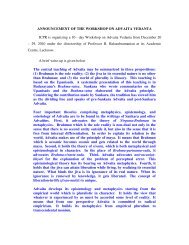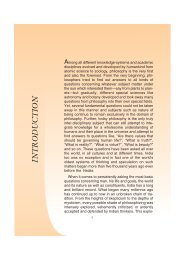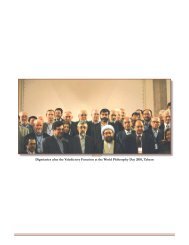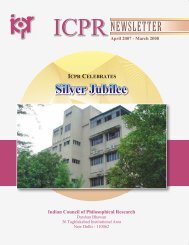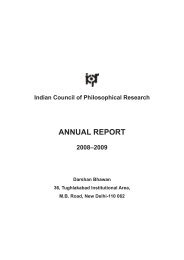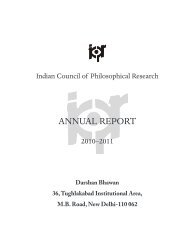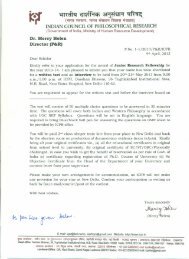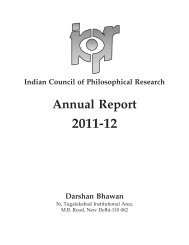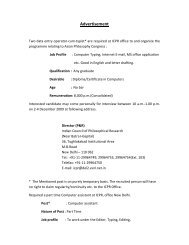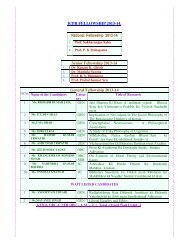Newsletter - Indian Council of Philosophical Research
Newsletter - Indian Council of Philosophical Research
Newsletter - Indian Council of Philosophical Research
You also want an ePaper? Increase the reach of your titles
YUMPU automatically turns print PDFs into web optimized ePapers that Google loves.
ICPR<br />
January<br />
<strong>Newsletter</strong><br />
- March 2010<br />
Special Issue<br />
on<br />
First Asian Philosophy Congress<br />
Deepa-Prajvalana<br />
Published by the Member-Secretary, ICPR, 36, Tughlakabad Institutional Area, Mehrauli-Badarpur Road, (Near Batra Hospital),<br />
New Delhi-62, Tel : 29964753, 29964754 Fax: 29964750. E-mail : icpr@del2.vsnl.net.in Website: www.icpr.in<br />
Layout, Design and Printing by Datagraph Creations Pvt. Ltd., Tel : 27221409, 47019171 Fax : 47091473<br />
<strong>Indian</strong> <strong>Council</strong> <strong>of</strong> <strong>Philosophical</strong> <strong>Research</strong><br />
Darshan Bhawan<br />
36 Tughlakabad Institutional Area<br />
New Delhi - 110062
Chairman, ICPR felicitating Dr. Kapila Vatsyayan, MP at the<br />
First Asian Philosophy Congresss
From Member-Secretary’s Desk<br />
The ICPR staff at the Grand Finale <strong>of</strong> the validiction <strong>of</strong> the Asian Philosophy Congress<br />
The successful completion <strong>of</strong> the First Asian<br />
Philosophy Congress has definitely opened a<br />
new chapter in the arena <strong>of</strong> Asian philosophy<br />
for those who are actively engaged in the promotion<br />
<strong>of</strong> philosophy, history and culture <strong>of</strong> Asia. The<br />
Congress brought about a consciousness <strong>of</strong>, and a<br />
new platform for, Asian Philosophy. It is for the first<br />
time that the community <strong>of</strong> philosophers in Asia and<br />
other parts <strong>of</strong> the world deliberated on the identity<br />
and exclusiveness <strong>of</strong> Asian thinking which has been<br />
systematically stamped by the West as religion, anthropology<br />
and such other sundry stuff so far. We at ICPR<br />
are very glad that it is not going to be that way any<br />
more and Asian philosophy and culture will come to<br />
occupy their due place <strong>of</strong> prominence in the world<br />
very soon.<br />
It is simply a matter <strong>of</strong> great regret that <strong>of</strong>ten Asian<br />
thinking is depicted in the West as no philosophy at all.<br />
We may partly be blamed for not being able to portray<br />
our philosophy in the right perspective so as to make<br />
it is available to others in a philosophical format to<br />
be understood by all. Doing so would help realize the<br />
value as well as the complexity that are involved and<br />
remain hidden in the thought structures which have<br />
been the foundations <strong>of</strong> the theorization and practice<br />
in Asia for thousands <strong>of</strong> years. Its non-disclosure may<br />
be due to a communication gap, it may be a gap in<br />
the logical adequacy, or it may be a cultural gap, but<br />
with globalization all such gaps created by the nonunderstanding<br />
<strong>of</strong> the other, should vanish and the<br />
marginalized thought-structures must look forward to<br />
coming into proper focus.<br />
In many ways, the Asian Philosophy Congress created<br />
a new forum to address the above issues and to create a<br />
niche for Asian thought and it was, for all participants,<br />
an exciting welcome and was a special moment <strong>of</strong> pride<br />
for us at ICPR. Building on the model <strong>of</strong> a world class<br />
venture to promote philosophy in general and that <strong>of</strong><br />
Asia in particular, the Congress was designed to showcase<br />
Asia’s all round strides and with restructured<br />
models that will bring “unity <strong>of</strong> thinking” among the<br />
nations interacting with one another’s thought, it may<br />
well fashion Asia into the other philosophical giant.<br />
With Dr. Kapila Vatsyayan at the inauguration and<br />
Dr. Karan Singh at the valedictory <strong>of</strong> the Congress,<br />
there were 763 participants including 75 persons from<br />
abroad who presented papers. A remarkable feature<br />
<strong>of</strong> this event is the collaborative participation <strong>of</strong> FISP
and their President, Pr<strong>of</strong>essor William McBride who<br />
not only welcomed the deliberations enthusiastically,<br />
attended all the important sessions but also greatly<br />
enhanced the prestige <strong>of</strong> the Congress and enriched it<br />
with a special round table sponsored by them.<br />
With such enthusiastic participation and success, we<br />
at ICPR are looking forward with excitement and<br />
optimism to make the Asian Philosophy Congress an<br />
international philosophical body with its own unique<br />
character and place among the philosophical bodies <strong>of</strong><br />
the world. We are glad that our Chairman Pr<strong>of</strong>essor K.<br />
Ramakrishna Rao, who was the chief architect <strong>of</strong> the<br />
very First Congress which was held recently, is elected<br />
as the President <strong>of</strong> the Asian Philosophy Congress<br />
which will meet once in two years in different parts <strong>of</strong><br />
Asia. Pr<strong>of</strong>essor Rao is busy with making plans for the<br />
new organization; and I know he welcomes all your<br />
inputs to make it a vibrant and dynamic body.<br />
I thank all my colleagues from ICPR and JNU who<br />
spared no pains to make this Congress a grand success,<br />
with my special mention highlighting the hard work<br />
put in by Sreekumaran, Mohinder Chopra and Sunil<br />
Sabharwal who most readily took upon themselves a<br />
large chunk <strong>of</strong> responsibilities to make this event a<br />
truly successful one.<br />
A piece <strong>of</strong> good news for the Acadmeic Centre,<br />
Lucknow: Dr. Mercy Helen, Director (Planning and<br />
<strong>Research</strong>) has finally joined duty at the Academic<br />
Centre. With her joining, I hope the activities at the<br />
Academic Centre will be more vibrant and we would<br />
be able to reach out with all our programmes and be<br />
able to be <strong>of</strong> maximum help with our new library<br />
collections to all those interested in philosophy. ICPR<br />
is in the process <strong>of</strong> implementing a plan from the next<br />
academic year with full accountability and transparency<br />
in administration. The focus will increasingly also be<br />
on providing seamless services along with a diversity<br />
<strong>of</strong> programmes for the promotion <strong>of</strong> philosophical<br />
research in the country.<br />
I believe that it is the confidence which the academics<br />
and research scholars including Junior <strong>Research</strong><br />
Fellows have reposed in ICPR that keeps us striving<br />
continuously to meet the expectations and goals <strong>of</strong><br />
our own as well as those <strong>of</strong> the entire <strong>Indian</strong> philosophical<br />
community. I hope to come back to you<br />
with new programmes and prospects with the new<br />
academic year that will start form April 2010.<br />
G. Mishra<br />
Member Secretary<br />
ICPR Staff at Registration Counter <strong>of</strong> First Asian Philosophy Congress
Chairman’s Speech<br />
Asian Philosophies in Search <strong>of</strong> Identity<br />
I<br />
am happy that India is hosting the 1st Asian<br />
Philosophy Congress and the <strong>Indian</strong> <strong>Council</strong> <strong>of</strong><br />
<strong>Philosophical</strong> <strong>Research</strong> has taken the initiative to<br />
sponsor and organize it with the active support and<br />
participation <strong>of</strong> a number <strong>of</strong> sister organizations in<br />
the country. During many years <strong>of</strong> my pr<strong>of</strong>essional<br />
career, I had numerous occasions to attend international<br />
conferences in Europe and America and more<br />
recently in Asia. Invariably, with very few exceptions<br />
indeed, did I ever experience my identity as an<br />
<strong>Indian</strong> or Asian thinker at these forums even when a<br />
conference was held in Asia. I say this because most<br />
international academic forums are deeply Western,<br />
colored in their deliberations by Western concepts,<br />
categories, methods and models. There is <strong>of</strong> course<br />
constant talk about pluralism and inter-culturalism at<br />
these forums; but that pluralism reflects and refers only<br />
to the divisions and differences analogous to those in<br />
Western thought. The Eastern thought systems and<br />
categories <strong>of</strong> understanding used in them seldom find<br />
their way in the discussions. What we have at these<br />
forums is a cultural amalgamation and not a mosaic <strong>of</strong><br />
Pr<strong>of</strong>essor K. Ramakrishna Rao during the First Asian<br />
Philosophy Congress<br />
<br />
different traditions. In other words, what we find here<br />
is that the dominant Western identity takes the form<br />
<strong>of</strong> global identity.<br />
My participation in the international forums is<br />
successful to the extent that I was able to use my<br />
Western learning. I am persuaded that this kind <strong>of</strong><br />
globalization hurts healthy philosophical exchanges<br />
needed between different traditions and thus is likely<br />
to be counterproductive. I believe, there is an urgent<br />
need for correction if these world forums were to be<br />
truly international in spirit, intent and practice. I am<br />
not saying this in any narrow, chauvinistic sense to<br />
belittle the present Western dominance, but to highlight<br />
its negative effects on the creative contribution<br />
<strong>of</strong> philosophers coming from non-Western traditions.<br />
I believe the establishment <strong>of</strong> the Asian Philosophy<br />
Congress and the organization <strong>of</strong> this conference are<br />
important steps in moving in the direction <strong>of</strong> not only<br />
finding an identity for Asian philosophies but also<br />
asserting it in all international forums.<br />
It is in the larger interests <strong>of</strong> global organizations that<br />
they mirror diversity. The unity or identity <strong>of</strong> a group
can be built to last only on the solid foundation that<br />
recognizes and reflects the diversity <strong>of</strong> its members.<br />
The situation gets complicated when there is a pyramidal<br />
hierarchy <strong>of</strong> organizations involved. As I see<br />
it, the problem in philosophy is that we have national<br />
organizations and the International Federation. The<br />
distance between national level organizations and the<br />
international forums is too far and wide to permit the<br />
formation <strong>of</strong> a composite mosaic <strong>of</strong> philosophies.<br />
There is need for an identity broader than national and<br />
narrower than the global philosophical identity, which<br />
could be a bridge between the national and international<br />
forums. The Asian Philosophy Congress could<br />
work toward promoting such regional and transnational<br />
identities.<br />
Now, one may raise the question whether there is<br />
any philosophically meaningful sense in which we<br />
can understand regional philosophical identities. We<br />
may speak <strong>of</strong> different philosophical traditions like<br />
idealism and realism, pragmatism and positivism,<br />
absolutism and pluralism. How can regional identities<br />
like Australian philosophy and Asian philosophy<br />
be philosophically meaningful, even though they may<br />
make some geographical sense Philosophy as a discipline<br />
should be universal like physics. There cannot be<br />
<strong>Indian</strong> physics or Asian physics. So goes the argument.<br />
I humbly disagree.<br />
Perhaps, there could be a perennial philosophy in<br />
some sacred sense. However, in real life and practice,<br />
I believe, philosophy, like most other social disciplines,<br />
is contextual. I share the view that philosophies<br />
are characteristic ways <strong>of</strong> reacting to the problems<br />
<strong>of</strong> the world confronting and agitating the human<br />
mind. “Universal philosophy,” whatever that might<br />
mean, cannot be contained in a common intellectual<br />
capsule inasmuch as philosophy can hardly be studied<br />
outside <strong>of</strong> its social and cultural moorings and current<br />
contexts. Therefore, the focus <strong>of</strong> philosophical attention<br />
may not be on the consideration <strong>of</strong> concepts<br />
and categories, dialectics and dialogues in a cultural<br />
vacuum. Trivial discussion on imaginary issues does<br />
little to advance wisdom. Rather the fulcrum <strong>of</strong> our<br />
pursuits and the centrality <strong>of</strong> our themes may be<br />
such that they revolve around the practical problems<br />
and actual operations, the existential predicament <strong>of</strong><br />
inexorable longings <strong>of</strong> people divided in numerous<br />
ways, the ubiquitous problems and challenges and the<br />
unending search for remedies. The perennial problem<br />
<strong>of</strong> philosophy is its relevance to life and not its isolation<br />
from it. I am persuaded that Asian philosophies<br />
form the early beginnings have espoused this notion.<br />
From our perspective, philosophy cannot originate in a<br />
cultural vacuum. Philosophy has a practice and applied<br />
dimension that is <strong>of</strong>ten ignored by arm-chair philosophers.<br />
Applied philosophies are necessarily contextual,<br />
and not isolated but interdisciplinary. Again, this is the<br />
hallmark <strong>of</strong> wisdom as distinguished from knowledge.<br />
Also, philosophy may be seen as the running thread<br />
that weaves the cultural fabric. In a significant sense<br />
it is what gives identity and distinctiveness to a tradition.<br />
During the years <strong>of</strong> colonial dominance in many<br />
countries <strong>of</strong> Asia, knowledge was cut loose from the<br />
native traditions and this resulted in an identity crisis<br />
in all culture-bound disciplines; and philosophy was<br />
no exception.<br />
I can speak with some conviction that philosophy in<br />
India since the colonial period has suffered an identity<br />
crisis and is still reeling from its effects. <strong>Indian</strong><br />
philosophy has from classical times had its own identity.<br />
Philosophy in India is applied in a large measure<br />
since Vedic times and it is nurtured by interdisciplinary<br />
involvement.<br />
Because <strong>of</strong> its avowed involvement with life, <strong>Indian</strong><br />
philosophy grew along with religion, science and other<br />
human endeavors. So we find that Hindu scriptures<br />
like the Vedas and the Bhagavad Gītā are rich sources<br />
<strong>of</strong> classical <strong>Indian</strong> philosophy. Again, valuable philosophical<br />
ideas are embedded in medical texts like<br />
Caraka Samhitā, political-economic treatises like Kautilya’s<br />
Artha Śāstra, legal codes like Jaimini’s Dharma<br />
Śāstra, the art books like Bharata’s Nātya-Śāstra and
Vātsyāyana’s Kāma-Sūtra and psychological thought<br />
and practices as in Patañjali’s Yoga-Sūtra. Philosophy in<br />
India has been truly a wisdom discipline. Wisdom is<br />
knowledge applied to life.<br />
This tradition <strong>of</strong> philosophy as wisdom to be cultivated<br />
continued unabated until British education<br />
found its way into <strong>Indian</strong> universities and colleges<br />
during the colonial rule. It is the Western influence<br />
that brought about the identity crisis among <strong>Indian</strong><br />
philosophers. Some have weathered the Western influence<br />
by meekly and reverentially accepting the old and<br />
the traditional while some others abandoned the native<br />
identity altogether and embraced uncritically Western<br />
concepts and categories. However, the vast majority<br />
<strong>of</strong> those pursuing philosophy could not meaningfully<br />
relate themselves either to the old classical thought<br />
in the changed circumstances or the new, borrowed<br />
Western thought. Thus, under the shadow <strong>of</strong> Western<br />
influence, philosophy in India suffered some kind <strong>of</strong><br />
an eclipse and most <strong>Indian</strong> philosophers lost their<br />
identity.<br />
If there is any original thought <strong>of</strong> any consequence<br />
during this period it originated with few exceptions<br />
outside the academia in the writings and actions <strong>of</strong><br />
thinkers like Sri Aurobindo, M.N. Roy and Mahatma<br />
Gandhi. Again, philosophical ideas have emerged in<br />
their work in an applied format and have grown in an<br />
interdisciplinary context to improve human condition.<br />
Sri Aurobindo who began as a political rebel and revolutionary<br />
turned a saint. By blending Vedānta and Sām.<br />
khya-Yoga, he evolved a model <strong>of</strong> the man that laid<br />
the foundation for what is now rightly called <strong>Indian</strong><br />
psychology. In other words, we find in Sri Aurobindo a<br />
consummate application <strong>of</strong> classical <strong>Indian</strong> thought to<br />
contemporary psychological topics. The most recent<br />
celebrity <strong>Indian</strong> philosopher is Amartya Sen whose<br />
thought has grown out <strong>of</strong> the main discipline <strong>of</strong><br />
economics and at the same time pr<strong>of</strong>oundly impacting<br />
thinkers <strong>of</strong> diverse hues in the country. Again his ideas<br />
have interdisciplinary and applied relevance.<br />
I have reason to think that what is true <strong>of</strong> India is<br />
true <strong>of</strong> several other countries in Asia. Philosophies in<br />
Asia would have little to celebrate as making creative<br />
contributions in advancing philosophical wisdom<br />
unless they regain their lost identities. It is my hope<br />
that conferences like this would help not only to find<br />
our own native identities as philosophers, but also<br />
help develop a meaningful mosaic <strong>of</strong> common Asian<br />
identity, which in its turn would lead to the emergence<br />
<strong>of</strong> a truly global forum for philosophers in which the<br />
multiple regional identities are seen both as distinctive<br />
and homogeneous.<br />
However, we need to say a word <strong>of</strong> caution. Just as<br />
the international forums become dysfunctional in<br />
proportion to the degree <strong>of</strong> their failure to display the<br />
diversity <strong>of</strong> the constituent members, so would this<br />
Asian Philosophy Congress lose its significance if it<br />
became stratified by a single tradition, however intellectually<br />
rich and stimulating that tradition might be.<br />
Therefore, I hope that the Asian Philosophy Congress<br />
would evolve itself to be a true intellectual mosaic<br />
depicting the idiom and themes <strong>of</strong> all the constituting<br />
traditions. It is heartening that we have amidst<br />
us Western scholars deeply involved in disseminating<br />
Asian thought globally and in some significant ways<br />
enriching it. To appreciate, value and even advance<br />
Asian philosophies one does not have to be born<br />
or be living in Asia. The contributions <strong>of</strong> Dr. Karl<br />
Potter, for example, surpass those <strong>of</strong> several <strong>of</strong> us in<br />
showcasing Asian contributions in general and <strong>Indian</strong><br />
contributions in particular as rich philosophical heritage<br />
<strong>of</strong> humankind.<br />
On behalf <strong>of</strong> the <strong>Indian</strong> <strong>Council</strong> <strong>of</strong> <strong>Philosophical</strong><br />
<strong>Research</strong> and the other host organizations and on my<br />
own behalf I extend a warm welcome and wish all <strong>of</strong><br />
you happy and memorable stay in Delhi and productive<br />
participation in the Congress. I am myself looking<br />
forward to a week <strong>of</strong> rich interpersonal philosophical<br />
engagement and an interesting intercultural dialogue<br />
<strong>of</strong> Asian thinkers in search <strong>of</strong> identity.
New Additions to ICPR/Retirement<br />
Farewell to Shri Shyamal Kumar Sen<br />
Sh. S.K. Sen (center) with his wife on the occassion <strong>of</strong> his retirement<br />
farewell at Darshan Bhawan, ICPR, New Delhi<br />
Shri Shyamal Kumar Sen joined ICPR <strong>of</strong>fice in 1989<br />
and retired from service in 2009. Shri Sen has rendered<br />
valuable services to ICPR Academic Centre, Lucknow<br />
as well as Headquarter <strong>of</strong>fice in New Delhi. He served<br />
ICPR in different capacities and retired as Superintendent<br />
(Administration & Finance) on November 30,<br />
2009.<br />
In recognition <strong>of</strong> the valubale services rendered<br />
by Shri Sen, a fond farewell was organized at Delhi<br />
ICPR Office. Shri Sen was felicitated with a shawl by<br />
Pr<strong>of</strong>essor G. Mishra, Member Secretary, and a token<br />
gift by the ICPR staff.<br />
We are glad to say that as per the convention started in<br />
the ICPR by the present Member Secretary, Pr<strong>of</strong>essor<br />
G. Mishra, all the retirement benefit and dues were<br />
disbursed to Shri Sen during the felicitation Session on<br />
November 30, 2009 itself.<br />
ICPR Publication at display during Conference
First Asian Philosophy Congress<br />
Inauguration <strong>of</strong> a Forum for Philosophy and Philosophers in Asia<br />
Venue: Jawaharlal Nehru University, New Delhi, India<br />
March 6-9, 2010<br />
Inaugural function <strong>of</strong> the First Asian Philosophy Congress<br />
With the imaginative initiative <strong>of</strong> the <strong>Indian</strong> <strong>Council</strong><br />
<strong>of</strong> <strong>Philosophical</strong> <strong>Research</strong>, New Delhi, and with<br />
academic and financial collaborations <strong>of</strong> several sister<br />
organizations and other institutions interested in<br />
philosophy, the concept <strong>of</strong> creating a Forum for Asian<br />
Philosophy and Philosophers, was actualized in the<br />
maiden meeting <strong>of</strong> the Congress held during March<br />
6-9, 2010. The inauguration <strong>of</strong> this mega event took<br />
place with an assembly <strong>of</strong> more than 700 philosophers<br />
and academicians from all over the world at the Jawaharlal<br />
Nehru University, New Delhi, on 6th March<br />
2010 at 3 p.m. The inaugural function was chaired<br />
by Pr<strong>of</strong>essor K. Ramakrishna Rao, Chairman, ICPR,<br />
who conceived this idea to have the Congress <strong>of</strong> this<br />
scale. Pr<strong>of</strong>essor R. Kumar, Rector, JNU, welcomed the<br />
gathering after the Vedic prayer rendered by Pr<strong>of</strong>essor<br />
Sashiprabha Kumar. The felicitations for the Congress<br />
were conveyed by Pr<strong>of</strong>essors William McBride, Marietta<br />
Stepanyants, Karl Potter, Sabyasachi Bhattacharya<br />
and Javeed Alam who not only highlighted the need<br />
for creating a forum for the philosophies in Asia but<br />
also emphasised the variety and diversity <strong>of</strong> traditions<br />
<strong>of</strong> Asian thinking. Dr. Kapila Vatsyayan, the renowned<br />
scholar-parliamentarian <strong>of</strong> the country, delivered the<br />
inaugural address and Pr<strong>of</strong>essor G. Mishra, Member-<br />
Secretary, ICPR, proposed the vote <strong>of</strong> thanks.<br />
The well-designed, topically organized Congress was<br />
held in a large number <strong>of</strong> sessions consisting <strong>of</strong> Plenaries,<br />
Symposia, Round Tables, Special Lectures and<br />
Sectional presentations. Pr<strong>of</strong>essor William McBride<br />
Chaired the first Plenary session entitled, “Asian Mind:<br />
Affinities and Diversities”. Pr<strong>of</strong>essor Charles Muller<br />
[Wonhyo’s Approaches to the “Commensuration”<br />
(hwajaeng) <strong>of</strong> Doctrinal Discrepancies], Pr<strong>of</strong>essor<br />
Arindam Chakraborty [“Understanding Other Living<br />
Beings: Zaungzi, Dharmakirti and Abhinavagupta on<br />
Other Minds”], Pr<strong>of</strong>essor Douglas Allen, USA, [Asian
Philosophies in Times <strong>of</strong> Globalization] and Dr. Alex<br />
Wynne, UK, [“Is there an Early Buddhist Philosophy]”<br />
presented their papers followed by very lively<br />
discussion by the participants.<br />
The second day started with the second Plenary on<br />
the topic “Traditions <strong>of</strong> Thinking: Asian <strong>Philosophical</strong><br />
Identity” and was chaired by Pr<strong>of</strong>essor Srinivasa<br />
Rao, with the speakers Pr<strong>of</strong>essors Marietta Stepanyants,<br />
Moscow, [Asian Values to a Multi-polar World],<br />
Chirapat Prapandvidya, Thailand, [Phana, the Gnomic<br />
Poetry <strong>of</strong> the North-Eastern Thai: its <strong>Philosophical</strong><br />
Implication <strong>of</strong> Buddhism and Brahmanism], Asanga<br />
Tilakaratne, Sri Lanka, [In What sense Buddhist Philosophy<br />
is Philosophy] and Arvind Sharma, Canada,<br />
[The Asian Concept <strong>of</strong> Religion and its Implication<br />
for Religious Freedom in the Modern World].<br />
The topic for the third Plenary (on 8th March 2010)<br />
was “Philosophy and Religion: East and West” and it<br />
was chaired by renowned Russian Indologist Pr<strong>of</strong>essor<br />
Marietta Stepanyants, Moscow. Speakers who participated<br />
in this programme were Pr<strong>of</strong>essors William L.<br />
McBride, President, FISP, USA [Philosophy and Religious<br />
Beliefs: Is There a Boundary], Pr<strong>of</strong>essor Victoria<br />
Pr<strong>of</strong>essor Marietta Stepanyants, Moscow, Chairperson <strong>of</strong> the session on<br />
Philosophy & Religion: East & West<br />
Lysenko, Moscow: [Relation between Philosophy and<br />
Religion in India: Overcoming the Eurocenric Stereotypes],<br />
Vladimir K. Shokhin, Moscow: [Comparative<br />
<strong>Philosophical</strong> Theology and Shankara’s Conception<br />
<strong>of</strong> Evil]. Dr. Luca Scarantino, Secretary General,<br />
<br />
FISP, Italy also participated as a special speaker in this<br />
session.<br />
The theme <strong>of</strong> the fourth Plenary was “<strong>Indian</strong> Philosophy:<br />
Retrospect and Prospects.” Chaired by Pr<strong>of</strong>essor<br />
K. Ramakrishna Rao, the session had very eminent<br />
speakers such as Pr<strong>of</strong>essors Karl Potter, USA: [The<br />
Meaning <strong>of</strong> “<strong>Indian</strong> Philosophy” and The Encyclopaedia<br />
<strong>of</strong> <strong>Indian</strong> Philosophies”]; T.S. Rukmani, Canada:<br />
[The Sannyasasrama in Hinduism: Retrospect and<br />
Prospects]; Srinivasa Rao, [What was, Is and Should<br />
be <strong>of</strong> Values in India] and G.C. Nayak, [“Sunyata,<br />
Nirvana and Mahakaruna – An Assessment”].<br />
Besides Plenaries, there were three Symposia<br />
programmed for the Congress. The first Symposium<br />
“Vedanta in the New Millennium” was chaired by<br />
Pr<strong>of</strong>essor Rama Rao Pappu, Miami University, Oxford,<br />
Ohio. Swami Paramananda Bharati: [The Psychic Experience<br />
<strong>of</strong> the Cause <strong>of</strong> the Universe]; Swami Prasanna<br />
Venkatachariar Chaturvedi Swami: [Ramanuja: His<br />
Contribution to <strong>Indian</strong> philosophy and Culture]; Sri<br />
Atmachaitanya, USA: [Swami Satchidanandendra’s<br />
Contribution to Advaita Vedanta]; Pr<strong>of</strong>essor Srivatsa<br />
Goswami: [Prema-Bhakti Vedanta <strong>of</strong> Sri Caitanya]<br />
and Dr. Emmamuel Uppamthadathil:<br />
[Theory <strong>of</strong> Causality: A Tool<br />
for Unfolding <strong>Indian</strong> Metaphysics]<br />
presented their papers.<br />
Pr<strong>of</strong>essor Mrinal Miri chaired<br />
Symposium II on the topic ‘Facets<br />
<strong>of</strong> <strong>Indian</strong> Philosophy” and speakers<br />
who participated were Pr<strong>of</strong>essor<br />
Ramakrishna Bhattacharya, [The<br />
Social Outlook <strong>of</strong> the Charvaka/<br />
Lokayata: A Reconstruction];<br />
Pr<strong>of</strong>essor R. Gopalakrishnan, [The<br />
Twice-Born Soul and Its States <strong>of</strong><br />
Limitation and Liberation—Saiva<br />
Siddhanta Perspective]; Dr. Lara<br />
Mitias, Cairo: [Dualisms East and<br />
West: Resolving Cartesian Problems<br />
with the Insights <strong>of</strong> Samkhya Yoga];<br />
Pr<strong>of</strong>essor Tandra Patnaik, [God as Sunya: A Study <strong>of</strong><br />
Bauddha-Vaisnavism <strong>of</strong> Odisha] and Dr. Bindu Puri,<br />
[Swaraj and Satyagraha in Gandhi.]<br />
The third Symposium was devoted to the traditional<br />
philosophical deliberations and it was held entirely in
Sanskrit. Sponsored by Rashtriya Sanskrit Sansthan,<br />
New Delhi, and chaired by Pr<strong>of</strong>essor R.V. Tripathi,<br />
the highlighted topic was: “India’s Intellectual Tradition:<br />
Pandit Parishad”. Pr<strong>of</strong>essor Tripathi spoke on<br />
“Aesthetics Tradition in India” which was followed by<br />
other prominent speakers such as Dr. Prahlada Char,<br />
[Intellectual Tradition in Nyaya in the last Millennium];<br />
Dr. Lakshmi Tatacharya, [Visistadvaita as a<br />
Living Tradition”] and Dr. Ramanuja Devanathan,<br />
[The Philosophy <strong>of</strong> Grammar in the <strong>Indian</strong> Tradition].<br />
This session also witnessed a huge gathering and was<br />
attended by many scholars from abroad who came to<br />
hear spoken philosophical Sanskrit<br />
which still very much exists in India.<br />
The six Panels to discuss different<br />
issues on Asian Philosophy were<br />
one <strong>of</strong> the major highlights <strong>of</strong><br />
the Congress. The Panel I on<br />
“Anekantavada (Non-absolutism):<br />
A Philosophy <strong>of</strong> Peaceful Co-existence”<br />
was sponsored by Jain Vishva<br />
Bharati University, Ladnun, and<br />
was chaired by Samani Dr. Mangalprajna.<br />
The eminent speakers on<br />
this panel were: Dr. M.R. Gelra, [A<br />
New Dimension Dealing with the<br />
Applications <strong>of</strong> Anekanta]; Dr. D.N.<br />
Bhargava, [Anekanta as the Basis <strong>of</strong><br />
Reconciliation at the Mental Level];<br />
Dr. S.L. Gandhi, [Anekanta as a<br />
Panel discussion on Anekantavada by Jain Viswa Bharati University<br />
Roadmap to Universal Peace]; Pr<strong>of</strong>essor S.R. Bhatt,<br />
[Holistic Approach to Reality and Life in Jain Philosophy]<br />
and Pr<strong>of</strong>essor A. K. Mookerjee, [Anekantavada<br />
: An Answer to Cultural Conflict].<br />
The second Panel discussion was devoted to<br />
“Perspectives <strong>of</strong> <strong>Indian</strong> Philosophy: Western and<br />
Non-Western.” Sponsored by PHISPC and chaired by<br />
Pr<strong>of</strong>essor Bhuvan Chandel, New Delhi, the speakers<br />
on this Panel were Pr<strong>of</strong>essors S.P. Gautam, S. Panneerselvam,<br />
Subhada Joshi, R.C. Pradhan, and Bhagat<br />
Oinam.<br />
Dr. Marina Faetanini, UNESCO speaking on UNESCO &<br />
Philosophy at the Panel Discussion on Science and Philosophy<br />
chaired by Dr. Ranjit Nair<br />
Pr<strong>of</strong>essor Ranjit Nair chaired the<br />
third Panel discussion on “Science<br />
and Philosophy: Alliance for Developing<br />
Education”. The discussants<br />
included Dr. Ananta Kumar Giri,<br />
[Learning the Art <strong>of</strong> Wholeness:<br />
New Horizons <strong>of</strong> Theory and Practice]<br />
and Dr. Marina Faetanini, <strong>of</strong><br />
the UNESCO <strong>of</strong>fice in Delhi who<br />
spoke on UNESCO and Philosophy.<br />
Philosophy <strong>of</strong> Islam was the topic<br />
for the fourth Panel discussion.<br />
Chaired by Pr<strong>of</strong>essor Ghazala<br />
Irfan, the panel had the following<br />
discussants: Dr. Shahram Pazouki,
Pr<strong>of</strong>essor Ghazala Irfan Chairing the Panel Discussion on<br />
Philosophy <strong>of</strong> Islam<br />
Iran: [Mulla Sadra’s Philosophy: An Eastern Solution];<br />
Seyed Hassan Hosseini, Iran: [Faith and Truth,<br />
Two <strong>Philosophical</strong> Approaches towards the Problem<br />
<strong>of</strong> Religious Diversity: A Christian-based Theory <strong>of</strong><br />
Faith, and an Islamic-Grounded Theory <strong>of</strong> Truth];<br />
Mohd. Aijaz Khan, [Jihad: A Contemporary Issue]<br />
and Md. Iftekhar, [Islam and World Peace].<br />
The fifth Panel was on the topic “Vedic Vision <strong>of</strong><br />
Inclusiveness.” Pr<strong>of</strong>essor G.C. Tripathy, New Delhi,<br />
India chaired the session. The prominent speakers were<br />
Pr<strong>of</strong>essor S.P. Singh: [Vedic idea <strong>of</strong> Consciousness];<br />
Pr<strong>of</strong>essor S.R. Bhatt: [Vedic View <strong>of</strong> Life]; Pr<strong>of</strong>essor<br />
S.P. Kumar: [Vedic Conception<br />
<strong>of</strong> Human Body] and Dr. Vedvati<br />
Vaidik: [Prana in the Upanishads].<br />
The <strong>Indian</strong> <strong>Council</strong> <strong>of</strong> Historical<br />
<strong>Research</strong> sponsored the sixth Panel<br />
discussion on the topic “Sufism<br />
and Bhakti Philosophy in Mediaeval<br />
India”. Pr<strong>of</strong>essor Sabyasachi Bhattacharya,<br />
Chairman, ICHR presided<br />
over the session. The main discussants<br />
were Dr. Minakshi Khanna,<br />
[India: Bhakti Elements in Sufi Literature]<br />
and Dr. Vedavalli Narayanan,<br />
[Bhakti Movement in South India].<br />
In order to create adequate space for<br />
discussion on several philosophical<br />
topics, the Congress organised a few<br />
10<br />
Round Tables on different topics. The<br />
first Round Table was on “Gender,<br />
Culture and Philosophy in India<br />
and China”. Along with Pr<strong>of</strong>essor<br />
Manoranjan Mohanty, the Chair<br />
<strong>of</strong> the session, the speakers were<br />
Dr. Patricia Uberoi and few others.<br />
[Eastern and Western Cultures and<br />
their Differences]. The Congress<br />
lost the opportunity to be benefitted<br />
by the deliberations <strong>of</strong> the Chinese<br />
delegation because the visa which<br />
was granted did not reach them in<br />
time.<br />
The topic <strong>of</strong> the second Round Table<br />
was “Dharmic State and Society:<br />
Asian Experiments”. It was chaired<br />
by Pr<strong>of</strong> S.R. Bhatt and participant<br />
speakers were Pr<strong>of</strong>essor Douglas Allen, USA: [Hind<br />
Swaraj <strong>of</strong> Gandhi]; Pr<strong>of</strong>essor S. L. Gandhi, [Dharmic<br />
State in Jain Philosophy]; Pr<strong>of</strong>essor Rama Rao Pappu,<br />
USA: [Gandhi’s Rama Rajya as Utopia and Ecotopia]<br />
and Pr<strong>of</strong>essor Ramjee Singh: [Dharma according to<br />
Gandhi and Vinoba].<br />
“Community, Culture and Civil Society in Asia” was<br />
the topic <strong>of</strong> the Round Table - 3. Pr<strong>of</strong>essor R.P.<br />
Singh was the chair person and among the renowned<br />
participants speakers were Pr<strong>of</strong>essor Sergei Sere-<br />
Pr<strong>of</strong>essor K.S. Radhakrishnan speaking on Art, Science and Philosophy<br />
<strong>of</strong> formation <strong>of</strong> Policy in the Mahabharata. Dr. Ranjan K. Ghosh, Dr.<br />
Preeti Ghosh and others attending the Round Table
iany, Russia: [Philosophy as a Free<br />
Search for Knowledge: the Concept<br />
and its Transfer to Russia and India];<br />
Pr<strong>of</strong>essor K.S. Radhakrishnan: [Art,<br />
Science and Philosophy <strong>of</strong> Formation<br />
<strong>of</strong> Polity in the Mahabharata];<br />
Mr. Yoshiya Makita, Japan: [Inventing<br />
Asian Selves in Modernity: Shinpei<br />
Goto and the Emergence <strong>of</strong> Organic<br />
Theory <strong>of</strong> the State in Japan at the<br />
Turn <strong>of</strong> the Twentieth Century] and<br />
Pr<strong>of</strong>essor Sergey Chugrov, Russia<br />
: [Some Axiological Peculiarities <strong>of</strong><br />
Japanese Identity Crisis].<br />
Dr. K.K. Chakravarty, Chancellor,<br />
NEUPA chaired the fourth<br />
Round Table devoted to the theme:<br />
“<strong>Philosophical</strong> Foundations for Intercultural<br />
Understanding in Asia” with eminent speakers<br />
like Pr<strong>of</strong>essors G.C. Tripathy, [<strong>Indian</strong> World View as the<br />
Basis for <strong>Philosophical</strong> Understanding <strong>of</strong> Asia]; Sujata<br />
Miri, [Us and the Other: Tribal Perspective]; Kapil<br />
Kapoor, [Two Knowledge Cultures : <strong>Philosophical</strong><br />
Imperatives]; Srivatsa Goswami, [Bhakti: The <strong>Philosophical</strong><br />
Framework <strong>of</strong> Inter-cultural Understanding<br />
in the Context <strong>of</strong> Hindu –Muslim Interaction].<br />
The fifth Round Table was on the theme, “Social<br />
Theory and Asian Dialogues: Cultivating Planetary<br />
Conversations.” Chaired by Dr.<br />
Ananta Kumar Giri, the eminent<br />
speakers <strong>of</strong> this round table were:<br />
Dr. Vyasa Prasad: [Phenomenology<br />
and Vedanta]; Dr. Parthasarathi<br />
Mondal: [Philosophy: Social Theory<br />
and Asian Dialogues: Kant and<br />
Krishnachandra Bhattacharya]; Dr.<br />
Manindra K. Thakur: [Social Theory<br />
and Asian Dialogues: The Task <strong>of</strong><br />
Creative Theorizing].<br />
Dr. Supriya Rai speaking at the 6th Round Table on Disseminination <strong>of</strong><br />
Buddhism in India and Abroad: Pr<strong>of</strong>. A. Tilakratne in the chair.<br />
11<br />
The sixth Round Table was organised<br />
with Pr<strong>of</strong>essor Asanga Tilakaratne in<br />
the Chair. Sponsored by the Somaiya<br />
Institute <strong>of</strong> Buddhist Studies, the<br />
discussion was on the topic “Dissemination<br />
<strong>of</strong> Buddhism in India And Abroad.” The<br />
speakers included Pr<strong>of</strong>essor Ravindra Pant, [Spread <strong>of</strong><br />
Buddhism within India]; Dr. Supriya Rai, [Spread <strong>of</strong><br />
Mahayana Buddhism to China]; Dr. Parineeta Deshpande,<br />
[Dissemination <strong>of</strong> Buddhism to Korea] and<br />
Pr<strong>of</strong>essor Kalpakam Sankaranaryan, [Later Mahayana<br />
Buddhism in Japan].<br />
The next Round Table was sponsored by Akhil<br />
Bharatiya Darshan Parishad on the topic “The<br />
Concept <strong>of</strong> Prama”. Pr<strong>of</strong>essor S.P. Dubey chaired<br />
the session. Participant speakers were Pr<strong>of</strong>essor A.D.<br />
Sharma, [Nature <strong>of</strong> Prama in Buddhism]; Dr. Sohanraj<br />
Pr<strong>of</strong>essor S.P. Dubey, Pr<strong>of</strong>essor A.D. Sharma, Pr<strong>of</strong>essor H.S. Upadhyay<br />
with others during the session by Akhil Bharatiya Darshan Parishad
Tater, [Prama in Jainism]; Pr<strong>of</strong>essor<br />
H.S. Upadhyay, [Prama according<br />
to Vedanta]; Pr<strong>of</strong>essor R.C. Sinha,<br />
[Analysis <strong>of</strong> Prama in Contemporary<br />
<strong>Indian</strong> Thought].<br />
“Pursuit <strong>of</strong> Women Intellect and<br />
Activity in Independent India” was<br />
the topic <strong>of</strong> the Round table 7.<br />
Pr<strong>of</strong>essor Neelima Sinha chaired<br />
it and Pr<strong>of</strong>essor Chhaya Rai spoke<br />
on The Role <strong>of</strong> <strong>Indian</strong> Women<br />
Intellectuals on Present Cultural<br />
Predicament. Other speakers were<br />
Pr<strong>of</strong>essor Geeta S. Mehta, [Role and<br />
Fate <strong>of</strong> Women in <strong>Indian</strong> society];<br />
Pr<strong>of</strong>essor Neelima Sinha chairing the session on Pursuit <strong>of</strong> Women<br />
intellect by the Bharatiya Mahila Darshanika Parishad<br />
Pr<strong>of</strong>essor Debika Saha, [Pursuit <strong>of</strong> Women Intellect<br />
and Activity in Literature]; Pr<strong>of</strong>essor S. Uma Devi,<br />
[Independent India: Colonization <strong>of</strong> the Mind <strong>of</strong><br />
Intellectual Women] and Pr<strong>of</strong>essor Raj Kumari Sinha,<br />
[Female Foeticide in India: An Ethico-<strong>Philosophical</strong><br />
Perspective]. This programme was held with the<br />
sponsorship <strong>of</strong> Bhartiya Mahila Darshanika Parishad.<br />
Given to feminist movement, this session opened a lot<br />
<strong>of</strong> discussion and enthusiastic participation.<br />
A view <strong>of</strong> the session on Saiba Siddanta<br />
India: [Saiva Views on Liberation<br />
and the Relevance <strong>of</strong> Mala]; Dr.<br />
Alex Watson, UK: [Samkrantivada<br />
<strong>of</strong> the Pasupatas]; Dr. S.L.P.<br />
Anjaneya Sarma: [Examination <strong>of</strong><br />
the Paramoksa-nirasa-karika-vrtti]<br />
and Dr. Surendra Mohan Mishra:<br />
[Philosophy and Soteriology <strong>of</strong> the<br />
Pasupatas: An Eminent Asiatic Religious<br />
School].<br />
The “Tribal Communities <strong>of</strong> Asia:<br />
<strong>Philosophical</strong> Explorations” was<br />
taken up as the topic <strong>of</strong> the tenth<br />
Round Table. It was chaired by<br />
Pr<strong>of</strong> Sujata Miri and the speakers<br />
included Dr. Prasenjit Biswas, Dr.<br />
Bhagat Oinam and a few others.<br />
Saiva Perspectives on Liberation was the theme <strong>of</strong> the<br />
ninth Round Table. Chaired by Pr<strong>of</strong>essor Navjeevan<br />
Rastogi, the speakers were Pr<strong>of</strong>essor Dominic Goodal,<br />
Pr<strong>of</strong>essor Sujata Miri chairing the Round Table on<br />
“Tribal Communities <strong>of</strong> Asia” Dr. Oinam Bhagat<br />
speaking at the session<br />
12
Sectional meetings were held on third day which<br />
was participated in and attended by a large number<br />
<strong>of</strong> APC young and senior scholars alike. It spread in<br />
twelve parallel sessions on various important themes<br />
<strong>of</strong> Asian Philosophies.<br />
Bharatnatyam by the famous artist, Gita Chandran,<br />
Founder-President <strong>of</strong> Natya-Vriksha<br />
Swami Atmachaitanya speaking at the Symposium on<br />
Vedanta in the New Millenium. Swami Paramananda<br />
Bharati alongwith Pr<strong>of</strong>essor Srivatsa Goswami on the dais.<br />
Before dinner, there were cultural programmes<br />
organised in the evenings. On 7th March 2010, the<br />
Philosophy students from JNU gave a dance performance<br />
including dance by Iranian students. On 8th,<br />
a Bharatnatyam recital was given by Padmasri Geeta<br />
Chandran, a very eminent artist. The performance<br />
was very highly appreciated by all. Pr<strong>of</strong>essor Srivatsa<br />
Goswami who, on behalf <strong>of</strong> Shri Chaitanya Prema<br />
Samsthana sponsored the programme, was pr<strong>of</strong>usely<br />
thanked.<br />
Cultural Programme by JNU Philosophy Students – A Russian Dance<br />
13<br />
Pr<strong>of</strong>essor K. Ramakrishna Rao chairing S.K. Somaiya<br />
Memorial Lecture delivered by Pr<strong>of</strong>essor P.K.<br />
Mukhopadhyay, the speaker <strong>of</strong> the session<br />
In order to commemorate the contribution<br />
<strong>of</strong> Dr. S.K. Somaiya who not<br />
only shared the academic value <strong>of</strong><br />
the Congress but also made significant<br />
financial contribution to hold it.<br />
There was a Somaiya Memorial Lecture<br />
which was delivered on “Religion and<br />
Other” by Pr<strong>of</strong>essor P.K. Mukhopadhyay.<br />
Pr<strong>of</strong>essor K. Ramakrishna Rao<br />
presided over the lecture and Pr<strong>of</strong>essor<br />
G. Mishra spoke on the contribution <strong>of</strong><br />
Dr. S.K. Somaiya.<br />
There was a business session when the<br />
academic deliberations <strong>of</strong> the Congress<br />
were concluded and this session unanimously<br />
elected Pr<strong>of</strong>essor K. Ramakrishna<br />
Rao to be the next President <strong>of</strong> the Asian<br />
Philosophy Congress.
The proceedings <strong>of</strong> the First Asian Philosophy<br />
Congress came to an end with the Valedictory Function<br />
held at India Habitat Centre with a banquet<br />
dinner. Smt. Purandeshwari, Hon’ble Minister <strong>of</strong><br />
State, MHRD was the chief guest <strong>of</strong> this session. The<br />
Valedictory Address was delivered by senior parliamentarian<br />
and distinguished thinker and philosopher<br />
Dr. Karan Singh, President, ICCR, with Pr<strong>of</strong>essor<br />
K. Ramakrishna Rao, Chairman ICPR in the chair.<br />
Welcome address and summary <strong>of</strong> the proceedings <strong>of</strong><br />
the four day’s Asian Philosophy congress programme<br />
was presented by Pr<strong>of</strong>essor G. Mishra, Member Secretary,<br />
ICPR. Pr<strong>of</strong>essor R.P. Singh, who coordinated<br />
the event proposed a vote <strong>of</strong> thanks and wished that<br />
this APC should be perpetuated in the years to come.<br />
Chairman and Member Secretary thanked all the<br />
collaborators and the staff <strong>of</strong> ICPR for their support,<br />
help and assistance in making this event a grand<br />
success. With the interest and enthusiasm that was<br />
enthusiastically exhibited in the First Asian Philosophy<br />
Congress by participants from around the globe, the<br />
Congress may be presumed to be the opening up <strong>of</strong><br />
a very new and very promising horizon in the area <strong>of</strong><br />
Asian Philosophy.<br />
ICPR Academic Activities<br />
Panel Discussion on “Tradition <strong>of</strong> <strong>Indian</strong> Aesthetics: <strong>Philosophical</strong><br />
Perspectives” held at ICPR Acadmic Centre, Lucknow<br />
<strong>Indian</strong> <strong>Council</strong> <strong>of</strong> <strong>Philosophical</strong> <strong>Research</strong>’s Academic<br />
Centre, Lucknow organized a panel discussion on<br />
“Tradition Of <strong>Indian</strong> Aesthetics : <strong>Philosophical</strong><br />
Perspectives” on January 23, 2010 at 11.00 a.m. It was<br />
chaired by Pr<strong>of</strong>essor G. Mishra Member-Secretary,<br />
ICPR. Welcome address was given by Pr<strong>of</strong>essor Rakesh<br />
Chandra, Head, Philosophy Department, Lucknow<br />
University. Among the panellist were Pr<strong>of</strong>essor Radhavallabh<br />
Tripathi, Vice-Chancellor, Rashtriya Sanskrit<br />
Sansthan, Pr<strong>of</strong>essor Navjeevan Rastogi, Lucknow, and<br />
Pr<strong>of</strong>essor B. Boruah, IIT Delhi.<br />
Workshop programme <strong>of</strong> Pr<strong>of</strong>essor Arvind Sharma<br />
<strong>of</strong> McGill University<br />
Pr<strong>of</strong>. Arvind Sharma, addressing the participants<br />
14<br />
Pr<strong>of</strong>. R. Tripathi, addressing the audience<br />
A two day Workshop-cum-Lecture programme was<br />
organised by the ICPR Academic Centre, Lucknow<br />
on 24th and 25th February 2010. The speaker was<br />
Pr<strong>of</strong>essor Arvind Sharma <strong>of</strong> McGill University, who is<br />
one among a few internationally renowned academics<br />
having vast experience in the field <strong>of</strong> education and<br />
administration. The theme <strong>of</strong> the two day event was<br />
“World’s Religions after 26/11”. On the 24th February,<br />
the programme started with a welcome by Dr. Mercy<br />
Helen, Director(P&R). Pr<strong>of</strong>essor Navjeevan Rastogi<br />
chaired the session and Pr<strong>of</strong>essor Ashok Vohra was<br />
the main discussant. In his interesting talk on the<br />
theme, Pr<strong>of</strong>essor Sharma touched on various aspects<br />
<strong>of</strong> the discourse which emerged in the wake <strong>of</strong> 9/11<br />
and 26/11 and the context <strong>of</strong> the event.
Seminar at Delhi University<br />
An international seminar on “I, We and the Other:<br />
Asymmetries <strong>of</strong> Moral Evaluation” was held in the<br />
National Seminar on “Swami Dayanand Saraswati“ organized by<br />
the Department <strong>of</strong> Sanskrit, DAV College, Abohar, Punjab<br />
A National Seminar on “Swami Dayanand Saraswati<br />
: Different Perspectives <strong>of</strong> thought” was held on<br />
9th January 2010. Organized by the Department <strong>of</strong><br />
Sanskrit, DAV College, Abohar, Punjab, it was sponsored<br />
by <strong>Indian</strong> <strong>Council</strong> <strong>of</strong> <strong>Philosophical</strong> <strong>Research</strong>,<br />
New Delhi. The seminar was inaugurated by Pr<strong>of</strong>essor<br />
Bhawanilal Bharatiya, former Head <strong>of</strong> the Dayanand<br />
<strong>Research</strong> Chair, Panjab University, Chandigarh.<br />
The inaugural session was chaired by Dr. Surendra<br />
Mohan Mishra, Dept. <strong>of</strong> Sanskrit, Pali & Prakrit,<br />
Kurukhestra University. Kurukshetra, Haryana and<br />
Pr<strong>of</strong>essor Virendra Kumar Alankar, Dept. <strong>of</strong> Sanskrit,<br />
Panjab University, Chandigarh delivered the welcome<br />
address.<br />
Dr. B.B. Sharma, Principal, DAV College, Abohar<br />
was the Director and Dr.P.C.Padhy, Head, Dept. <strong>of</strong><br />
Sanskrit was the convener <strong>of</strong> the National Seminar.<br />
There were thirty scholars who presented their papers<br />
covering four sessions on different sub-themes <strong>of</strong> the<br />
seminar. Dr.Satyapal Singh and Dr.(Mrs.) Saraswati<br />
from Delhi, Dr.Nirangan Sahu and Dr.(Mrs.) Madhuri<br />
Gupta from Ajmer, Dr.(Smt.) Vinay Sharma from<br />
Chittargarh, Dr. C.K.Jha & Dr.A.Mishra from Ambala,<br />
Dr. Rajpal Kaushik from Panipat, Dr. Mahinder Singh<br />
International Seminar/Seminars<br />
International Seminar on “I, We and the Other: Asymmetries<br />
<strong>of</strong> Moral Evaluation” held at Delhi University<br />
15<br />
Department <strong>of</strong> Philosophy, Delhi University, Delhi<br />
during February 16 - 18, 2010. About fifteen participants<br />
from abroad, twenty-five participants from all<br />
over India and fifty participants from Delhi took part<br />
in the proceedings <strong>of</strong> the seminar. The participants<br />
were not only from the Departments <strong>of</strong> Philosophy<br />
but also from the Departments <strong>of</strong> Linguistics, Sanskrit,<br />
Modern <strong>Indian</strong> and European Languages, Physics etc.<br />
The seminar was inaugurated by Pr<strong>of</strong>. K. Ramakrishna<br />
Rao.. He delivered the keynote address. Pr<strong>of</strong> Ashok<br />
Vohra was the coordinator <strong>of</strong> this seminar.<br />
Each <strong>of</strong> the lectures was followed by lively and intense<br />
discussion. Nineteen papers were presented and<br />
discussed during the seminar.<br />
Dignitaries at the dais on the occasion <strong>of</strong> ICPR<br />
National Seminar at DAV College, Abohar, Punjab<br />
from Jhajhar, Dr. K.B.Pandeya from Shriganganagar,<br />
Dr. Lakhbir Singh from Chandigarh, Dr.Vinod<br />
Kumar and Dr. (Smt.) Neeraj Sharma from Jalandhar.<br />
Pr<strong>of</strong>. Balwinder Kumar, Shri. Divakar Bharti and Shri.<br />
Sunil Shastri from Moga, Dr.Veena Jain, Dr Jagraon,<br />
Dr.Prabhat Singh from Hoshiarpur, Dr.Shishupal from<br />
Hanumangarh, Dr. Randhir Kaushik from Sangrur,<br />
Dr. Gaur Mohan Mathur, Shri. M.P.Bharadwaj and<br />
Smt. Gurmeet Kaur from Abohar participated in the<br />
seminar and discussions.
National Seminar on Parapsychology from the<br />
<strong>Indian</strong> <strong>Philosophical</strong> Perspective held at the Department<br />
<strong>of</strong> Psychology and Parapsychology, Andhra University<br />
The National Seminar on Parapsychology from<br />
<strong>Indian</strong> <strong>Philosophical</strong> Perspective was organized by<br />
the Department <strong>of</strong> Psychology and Parapsychology,<br />
Andhra University, on 11 and 12 January, 2010. This<br />
Seminar was funded primarily by <strong>Indian</strong> <strong>Council</strong> <strong>of</strong><br />
<strong>Philosophical</strong> <strong>Research</strong> (lCPR) and was also supported<br />
by the University Grants Commission.<br />
The Seminar began with the welcome address given<br />
by Dr. T.V. Ananda Rao, Pr<strong>of</strong>essor and Head <strong>of</strong> the<br />
Department <strong>of</strong> Psychology and Parapsychology,<br />
Andhra University. Dr. V. Gowri Rammohan,<br />
Director <strong>of</strong> the seminar and Pr<strong>of</strong>essor, Department<br />
<strong>of</strong> Psychology and Parapsychology, Andhra University,<br />
briefly presented to the audience the objectives<br />
<strong>of</strong> the seminar. Dr. K. Ramakrishna Rao, Chairman,<br />
<strong>Indian</strong> <strong>Council</strong> <strong>of</strong> <strong>Philosophical</strong> <strong>Research</strong>, New Delhi<br />
and Former Vice Chancellor, and Founder Head <strong>of</strong><br />
the Department <strong>of</strong> Psychology and Parapsychology,<br />
Andhra University, in his address as a Guest <strong>of</strong> Honor,<br />
unfolded the backdrop <strong>of</strong> the purpose for starting the<br />
Department which was mainly to promote research in<br />
parapsychology. The Vice Chancellor, Pr<strong>of</strong>. B. Satyanarayana<br />
and the Registrar, Pr<strong>of</strong>. P.V.G.D. Prasad Reddy<br />
expressed their high appreciation for this kind <strong>of</strong> a<br />
Seminar. Pr<strong>of</strong>. L.K. Mohan Rao, Principal, College <strong>of</strong><br />
Arts and Commerce, Andhra University, presided over<br />
the function.<br />
The first session began with the keynote address by<br />
Edwin C. May, titled “Challenges and opportunities in<br />
a multi-disciplinary conference” and it was followed by<br />
Pr<strong>of</strong>. V. N. Jha’s talk on ‘Psychology: A Classical <strong>Indian</strong><br />
Approach’. This was followed by a paper by Mr. V.V.<br />
Rammohan titled ‘Master EK’s spiritual psychology’.<br />
On the second day, Dr. P. Sriramamurti and Pr<strong>of</strong>.<br />
Sangeetha Menon addressed the issues <strong>of</strong> brain-self<br />
interrelations. The second session featured two papers,<br />
first paper entitled “Preksa Meditation and Psyche:<br />
Dignitaries on the dais at the ICPR National Seminar<br />
at Andhra University, Vishakhapatnam<br />
Parapsychological Approach” by Dr. J. P. N. Mishra<br />
explained Preksa Dhyana as a technique <strong>of</strong> meditation<br />
for attitudinal change and integrated development <strong>of</strong><br />
personality. In the second paper titled “Yoga tradition<br />
and anahat sabda yoga or surat sabda yoga”, Pr<strong>of</strong>. P.<br />
Sriramamurti elaborated on Surat Sabda yoga which<br />
aims to reach the ultimate state <strong>of</strong> transcendental<br />
consciousness. The third session comprised four<br />
papers <strong>of</strong> Dr. K.M. Tripathi, Mr. Taraka Rama Rao,<br />
Mr. K. Ramesh Babu and Pr<strong>of</strong>. V. Gowri Rammohan.<br />
The two-day Seminar concluded with a valedictory<br />
function with Dr. K. Ramakrishna Rao, as Chief<br />
Guest and the function was presided over by Pr<strong>of</strong>. T.V.<br />
Ananda Rao, Head <strong>of</strong> the Department <strong>of</strong> Psychology<br />
and Parapsychology, Andhra University. In his address<br />
Pr<strong>of</strong>. K. Ramakrishna Rao emphasized the need for<br />
more empirical research combining the rich <strong>Indian</strong><br />
cultural models and implementing the experimental<br />
model <strong>of</strong> the West. Pr<strong>of</strong>. Gowri Rammohan, Director<br />
<strong>of</strong> the Seminar, proposed a vote <strong>of</strong> thanks thanking<br />
the <strong>Indian</strong> <strong>Council</strong> <strong>of</strong> <strong>Philosophical</strong> <strong>Research</strong> for<br />
funding the Seminar which enabled her to organize<br />
it in the most be fitting way possible. Pr<strong>of</strong>. Gowri<br />
Rammohan thanked the Press and the Media for their<br />
wide coverage <strong>of</strong> the Seminar in the News papers and<br />
on the Television.<br />
16
National Seminar on the theme ‘Theorizing Body: Problems and<br />
Perspectives’ conducted at Calicut University<br />
National seminar on the theme ‘Theorizing Body:<br />
Problems and Perspectives’ was conducted at Calicut<br />
university on 27th, 28th and 29th <strong>of</strong> January 2010.<br />
Around 142 registered participants including 20<br />
resource persons attended the seminar. The sessions<br />
were conducted at the seminar complex <strong>of</strong> the University.<br />
The participants were mostly students, research<br />
scholars and teachers <strong>of</strong> Calicut university and other<br />
universities, institutions and colleges. The seminar was<br />
inaugurated by Pr<strong>of</strong>. Shefali Moitra, former Pr<strong>of</strong>essor<br />
<strong>of</strong> Philosophy <strong>of</strong> Jadavpur University on 27th <strong>of</strong><br />
January at 10.00 am. She spoke on the contemporary<br />
relevance and the interdisciplinary dimensions <strong>of</strong> the<br />
topic <strong>of</strong> the seminar. Pr<strong>of</strong>. K. Gopinathan, Pr<strong>of</strong>essor<br />
<strong>of</strong> Philosophy <strong>of</strong> Calicut University chaired one <strong>of</strong><br />
the sessions. Dr. T.V. Madhu, Director <strong>of</strong> the Seminar,<br />
presented the concept-paper on the theme <strong>of</strong> the<br />
Seminar.<br />
The inaugural session was followed by the key-note<br />
address by Pr<strong>of</strong>. P.R.K. Rao, former Pr<strong>of</strong>essor <strong>of</strong> IIT<br />
Kanpur. Pr<strong>of</strong>essor Rao made a power-point presentation<br />
which was centered on the problems implied in<br />
philosophizing about the body.<br />
Pr<strong>of</strong>. Udayakumar <strong>of</strong> Delhi University and Dr. Asha<br />
Achuthan <strong>of</strong> NIAS, Bangalore presented papers in<br />
the post -lunch session on the same day. This was<br />
followed by a special session b y Dr. Ian Mcdonald<br />
<strong>of</strong> Brighton University, UK. He spoke on ‘sporting<br />
body’ from a sociological perspective. There was also<br />
a film-screening session <strong>of</strong> a documentary directed by<br />
Dr. Ian Mcdonald which directly dealt with the question<br />
as to how body is being culturally and politically<br />
invested.<br />
Paper presentation at the ICPR National Seminar at<br />
Calicut Univerity, Kerala<br />
On the second day Pr<strong>of</strong>. Nizar Ahmed, former<br />
Pr<strong>of</strong>essor <strong>of</strong> Philosophy <strong>of</strong> Sree Sankaracharya<br />
University at Kalady and Dr. Anup Dhar, fellow <strong>of</strong> the<br />
Center for Study <strong>of</strong> Culture and Society, Bangalore, Dr.<br />
Koshy Tharakan, Associate Pr<strong>of</strong>essor <strong>of</strong> Philosophy,<br />
IIT Gandhinagar and Dr.V.T Pius, Assistant Pr<strong>of</strong>essor<br />
<strong>of</strong> Philosophy, Central University, Silchar presented<br />
their papers in the sessions.<br />
In the last session <strong>of</strong> the second day, Pr<strong>of</strong>. Shefali<br />
Moitra presented her paper titled ‘The epistemic<br />
turn: body and some feminist concerns’. Her paper<br />
attempted to show how feminist reconceptualization<br />
<strong>of</strong> body calls for a remapping <strong>of</strong> philosophy.<br />
On the third day, Pr<strong>of</strong>. Franson Manjali, Pr<strong>of</strong>essor <strong>of</strong> the<br />
Center for Linguistics and Cultural Studies, JNU, New<br />
Delhi and Dr. Abey Koshy, Reader in Philosophy <strong>of</strong> Sree<br />
Sankaracharya University, Kalady presented papers.<br />
National Seminar on Pandits: Twentieth Century Bengal’s<br />
Contribution to Classical <strong>Indian</strong> Philosophy <strong>of</strong> Language<br />
A National Seminar on Pandits: Twentieth Century<br />
Bengal’s Contribution to Classical <strong>Indian</strong> Philosophy<br />
<strong>of</strong> Language, organized by Department <strong>of</strong> Philosophy.<br />
Rabindra Bharati University, Kolkata and sponsored<br />
by <strong>Indian</strong> <strong>Council</strong> <strong>of</strong> <strong>Philosophical</strong> <strong>Research</strong>, New<br />
Delhi took place during 3-4 September, 2010. The<br />
key-note speaker was Pr<strong>of</strong>essor V.N. Jha who spoke <strong>of</strong><br />
the history <strong>of</strong> linguistic speculation in classical <strong>Indian</strong><br />
17
Philosophy right from the Vedic period. The seminar<br />
was inaugurated by hon’ble Vice-Chancellor <strong>of</strong> Rabindra<br />
Bharati University, Pr<strong>of</strong>essor Karunasindhu<br />
Das. Pr<strong>of</strong>essor Das spoke about the rich grammarian<br />
tradition (both Paninian and non-Paninian) <strong>of</strong> Bengal<br />
that thrived for last five hundred years. Pr<strong>of</strong>essor<br />
Godavarish a Misra and Pr<strong>of</strong>essor Prabal Kumar Sen<br />
spoke about the contribution <strong>of</strong> Pandit Yogendranath<br />
Bagchi. Pr<strong>of</strong>essor D.N.Tiwari spoke about the contribution<br />
<strong>of</strong> Pandit Dinanath Nabatirtha to philosophy<br />
<strong>of</strong> grammar.<br />
The valedictory address was delivered by Pr<strong>of</strong>essor<br />
Pradyot Kumar Mukhopadhyay. Pr<strong>of</strong>essor Mukhopadhyay,<br />
in his address, spoke in details on the uniqueness<br />
<strong>of</strong> the twentieth century Bengali Pandits’ contribution<br />
to <strong>Indian</strong> philosophy <strong>of</strong> language.<br />
Dr. N.N. Chakraborty addressing the audience<br />
Seminar organised by Dept. <strong>of</strong> Philosophy, S.B.M.S.College,<br />
Sualkuchi (Assam)<br />
A seminar was organised by the Dept. <strong>of</strong> Philosophy,<br />
S.B.M.S. College, Sualkuchi (Assam) on 15-2-10 on the<br />
topic “Humanism with special reference to Radhakrishanan”<br />
with the financial assistance given by ICPR.<br />
The resource person <strong>of</strong> the seminar was Pr<strong>of</strong>. Girish<br />
Sharma HOD <strong>of</strong> Philosophy, Gauhati University. Most<br />
<strong>of</strong> the participants took active part in the interactive<br />
session after the lecture <strong>of</strong> Pr<strong>of</strong> Sharma. The general<br />
feeling was that the great relevance <strong>of</strong> humanism in<br />
the present context was properly emphasized by the<br />
speaker.<br />
Participants interacting with the speaker<br />
One Day Seminar on Applied Ethics held at Dept. <strong>of</strong> Philosophy,<br />
Patna University, Bihar<br />
A One Day Seminar on Applied Ethics was organized<br />
by Dept. <strong>of</strong> Philosophy, Patna University, Bihar under<br />
the sponsorship <strong>of</strong> ICPR on 08-02-2010. Hon’ble<br />
Vice-Chancellor <strong>of</strong> Patna University, Dr. Shyam Lal<br />
Presided over the inaugural session and Dr. Shamshad<br />
Hussain, Ex- Vice-Chancellor <strong>of</strong> Magadh University,<br />
Bodh-Gaya inaugurated the session. Dr. Madhuri<br />
Verma, Head, Patna University and organizing secretary<br />
<strong>of</strong> the Seminar while welcoming the guests<br />
elaborated the theme and objective <strong>of</strong> the Seminar.<br />
The keynote address was given by Dr. l.N. Sinha, Retd.<br />
Pr<strong>of</strong>essor & Head, the Department <strong>of</strong> Philosophy,<br />
Patna University. He laid stress on the need for the<br />
application <strong>of</strong> ethical codes in various fields <strong>of</strong> human<br />
life for bringing about progress, prosperity, harmony,<br />
happiness and peace. There were technical sessions<br />
in which many scholar they included participated. Dr.<br />
Ramjee Singh, Retd. Pr<strong>of</strong>essor <strong>of</strong> Philosophy, T.M.<br />
18<br />
Seminar at Patna Universtiy<br />
Bhagalpur University, Bhagalpur, Dr. R.C. Sinha and<br />
Dr. M.P. Chaurasia. All these papers were discussed<br />
with questionnaire by the participants. The interactive<br />
session was lively and effective.
Grants sanctioned for new Seminar/conference/workshops etc.<br />
and Major/Minor <strong>Research</strong> Projects<br />
Following persons/institutes have been approved for Seminar/conference/workshop grant for the year 2009-10:<br />
S.No. Name Topic Amount<br />
1. Pr<strong>of</strong>essor Vanalnghak, Department<br />
<strong>of</strong> Philosophy, NEHU,<br />
Shillong<br />
2. Pr<strong>of</strong>essor Prasenjit Bisvas,<br />
Department <strong>of</strong> Philosophy,<br />
NEHU, Shillong<br />
3. Dr. D.K. Rana, Director, Chinmaya<br />
International Foundation<br />
Shodha Sansthan, Adi Sankara<br />
Nilayam, Ernakulam, Kerala<br />
4. Pr<strong>of</strong>essor Sundar Sarukkai,<br />
Manipal, Karnataka<br />
5. Pr<strong>of</strong>essor Srivatsa Goswami,<br />
Vrindavan<br />
6. Pr<strong>of</strong>essor A.K. Mohanty,<br />
Bhubaneswar<br />
7. Pr<strong>of</strong>essor A. Balaganapathi,<br />
Kuppam<br />
3-days National Seminar on THE OTHER AND<br />
THE COMMUNITY: PHILOSOPHICAL REF<br />
LECTIONS ON IDENTITIES, TRIBES AND<br />
WORLDVIEWS<br />
2-days Workshop-cum-Conference proposal entitled,<br />
METHODOLOGY OF PHILOSOPHICAL<br />
STUDY OF TRIBAL WORLDVIEWS IN THE<br />
CONTEXT OF INDIA’S NORTHEAST<br />
10-days textual workshop on INDIAN PHILOS-<br />
OPHY: A BRIEF ANALYTIC STUDY<br />
Summer School<br />
Bhakti and Sannyasa<br />
Human Rights and Social Justice<br />
Citizenship, Nationality and Globalization<br />
19<br />
Rs. 4.OO lacs<br />
Rs.2.00 lacs<br />
Rs.1.00 lac<br />
Rs.3 lacs<br />
Rs.2 lacs<br />
Rs.2 lacs<br />
Rs.1.5 lacs<br />
8. Dr. A.P. Dubey, Sagar Advaita Philosophy & Human Excellence Rs.1 lac<br />
9. Dr. Jagdish Patgiri (NER) Social Concerns lD <strong>Indian</strong> Philosophy Rs.2 lacs<br />
10. Dr. Sreekala Nair, Kalady Epistemology & Cognitive Studies:Their Interplay<br />
in Current Knowledge Analysis<br />
Rs.0.30 lacs<br />
Project Grant<br />
Following persons/institutes have been approved for the section <strong>of</strong> the project grant for the year 2009-10<br />
S.No. Name Topic Amount<br />
1. Dr. Samani Mangala<br />
Prajna, VC, Jain<br />
Viswa Barati, Ladnun<br />
EDITING OF THE PRASNA-<br />
VYAKARANA: A LOST JAINA<br />
TREATISE<br />
(Collaborative project for which ICPR<br />
commitment is Rs. 5.00 lacs with equal<br />
commitment from Jain Viswa Bharati, Ladnun)<br />
2. Dr. N.K. Ambastha,<br />
Dhanbad<br />
BHARAT-VARSH MEIN<br />
UGRAVA<br />
Rs.0.75 lacs<br />
3. Dr. Priyadarshi Patnaik,<br />
lIT, Kharagpur<br />
4. Dr. Kalpagam Sankaranarayanan<br />
METAPHYSICAL WRITINGS<br />
OF THE PANCASAKHA SAN-<br />
THAS OF MEDIAVAL ORISSA<br />
THE POWER OF WORD:<br />
SOCIO-PHILOSOPHICAL DI-<br />
MENSIONS OF BUDDHISM<br />
RS.1.00 lac per year<br />
SIBS, Mumbai (Collaborative project for<br />
which ICPR commitment is Rs. 2.5 lacs)
International Conference/Conference<br />
An International Conference on Schopenhauer organized by<br />
Dept. <strong>of</strong> Philosophy, Deshbandhu College, University <strong>of</strong> Delhi<br />
Smt. D. Purandeswari, Honorable Minister <strong>of</strong> State, HRD, chief guest<br />
releasing a book in the special session<br />
The Department <strong>of</strong> Philosophy, Deshbandhu College,<br />
University <strong>of</strong> Delhi: jointly with the Special Center for<br />
Sanskrit Studies, JNU in collaboration with the <strong>Indian</strong><br />
division <strong>of</strong> the Schopenhauer society Schopenhauer<br />
<strong>Research</strong> Center, Germany organized an international<br />
conference on the occasion <strong>of</strong> the 150th death anniversary<br />
<strong>of</strong> the well- known German philosopher,<br />
Arthur Schopenhauer (1788 - 1860). A large number<br />
<strong>of</strong> foreign scholars from Germany and UK and many<br />
scholars from all over India assembled at the Seminar<br />
Hall <strong>of</strong> Special Center for Sanskrit Studies, JNU during<br />
4-5 March 2010 to pay their tribute and respect in<br />
memory <strong>of</strong> the Western philosopher who carried the<br />
wisdoms <strong>of</strong> the Upanishads and the Buddhist ideals to<br />
the Western world.<br />
The <strong>Indian</strong> Division <strong>of</strong> the Schopenhauer Society<br />
jointly with the department <strong>of</strong> philosophy Deshbandhu<br />
college collaborated with the Special Center<br />
for Sanskrit Studies, JNU, and the Schopenhauer<br />
<strong>Research</strong> Center <strong>of</strong> the University <strong>of</strong> Mainz, Germany.<br />
Distinguished Schopenhauerian scholar Pr<strong>of</strong>. Matthias<br />
Kossler, the honorable President <strong>of</strong> the Schopenhauer<br />
Gesellschaft was present amongst others on this occasion.<br />
Dr. Arati Barua, Director, IDSS welcomed the gathering<br />
and requested Pr<strong>of</strong>. S.R. Bhatt, advisor <strong>of</strong> the<br />
seminar to give a thematic view <strong>of</strong> the conference.<br />
While the Principal <strong>of</strong> DBC, Dr. A.P. Raste gave a<br />
hearty welcome to all the guests. Besides the students,<br />
the teachers <strong>of</strong> Deshbandhu college as well as JNU<br />
and other institutions also participated in the seminar.<br />
Inaugurating the seminar Shri Vachaspati Upadhyaya,<br />
Vice Chancellor, Shri Lal Bahadur Shastri Rashtriya<br />
Vidyapeeth paid high tributes to Schopenhauer in his<br />
inaugural speech. Pr<strong>of</strong>essor Matthias Kossler, President<br />
<strong>of</strong> the Schopenhauer Gesellschaft delivered a<br />
special speech on the occasion.<br />
20
Book Release: by Smt. D. Purandeswari , honorable<br />
Minister <strong>of</strong> State, MHRD, marks a new chapter <strong>of</strong><br />
Indo-German relations during the international conference<br />
on Schopenhauer at JNU as the chief Guest in<br />
the special session <strong>of</strong> evening. She praised Arthur<br />
Schopenhauer, the first significant Western philosopher<br />
to recognize <strong>Indian</strong> Upanishads. The honorable<br />
minister also formally released a book “Gandhi and<br />
Grant: Their <strong>Philosophical</strong> Affinities” edited by Arati<br />
Barua, Deshabndhu College, published by Academic<br />
Excellence, New Delhi 2010 during the seminar.<br />
Each day <strong>of</strong> the seminar there were four academic<br />
sessions and in each session there were two papers for<br />
presentation. Thus 16 papers in total were presented<br />
in the seminar. Of these 16 papers, there were 8<br />
papers from foreign participants (6 from Germany, 1<br />
from UK, 1 from USA) and 8 from <strong>Indian</strong> scholars<br />
including (4 from outstation).<br />
Brief Report on the proceedings <strong>of</strong> 22nd Annual Conference <strong>of</strong><br />
All Orissa Philosophy Association<br />
A view <strong>of</strong> the Inaugural Function at the All Orissa<br />
Philosophy Association<br />
The twenty-second annual conference <strong>of</strong> All Orissa<br />
Philosophy Association was held in Choudwar College,<br />
Choudwar (Dist. Cuttack) on 23rd & 24th January<br />
2010. The conference was inaugurated by Pr<strong>of</strong>essor<br />
Jitendra Nath Mohanty, Pr<strong>of</strong>essor Emeritus, Temple<br />
University, Philadelphia, USA. Pr<strong>of</strong>. K.B. Jena, Principal<br />
<strong>of</strong> Choudwar College delivered the welcome<br />
address. Pr<strong>of</strong>essor S.K Mohanty, Vice-President <strong>of</strong><br />
the AOPA introduced the guests. Pr<strong>of</strong>essor S.C. Panigrahi,<br />
General Secretary <strong>of</strong> the Association presented<br />
a brief report on the different activities <strong>of</strong> the Association.<br />
Periodical Lectures<br />
Two Periodical Lectures organized by Dept. <strong>of</strong> Philosophy,<br />
C.M.P. Degree College, University <strong>of</strong> Allahabad<br />
The dignitaries on the dais<br />
21<br />
Dept. <strong>of</strong> Philosophy, C.M.P. Degree College, University<br />
<strong>of</strong> Allahabad organized two periodical lectures<br />
under the sponsorship <strong>of</strong> the ICPR, New Delhi. The<br />
first lecture organized on December 16,2009 was given<br />
by Pr<strong>of</strong>. Sabhajit Mishra, Retd. Pr<strong>of</strong>essor <strong>of</strong> Philosophy<br />
Department, D.D.U. Gorakhpur University<br />
on the topic - ‘Brain, Mind and Consciousness-with<br />
special reference to <strong>Indian</strong> Theories’. He spoke on<br />
how consciousness is related either to self or ego or<br />
mind or body from the viewpoint <strong>of</strong> <strong>Indian</strong> theories.<br />
The lecture was attended by around 300 students and<br />
50 teachers.<br />
The second lecture was organized on February 6, 2010<br />
by Pr<strong>of</strong>. Ram Lal Singh, Retd. Pr<strong>of</strong>essor, Philosophy
Department, Allahabad University. The topic <strong>of</strong> the<br />
lecture was ‘Matter, Mind and Consciousness.’ The<br />
learned speaker explained how consciousness is related<br />
either to self or ego or mind or body from the viewpoint<br />
<strong>of</strong> Upnishads. This lecture was also attended by<br />
a large number <strong>of</strong> students and teachers.<br />
According to Dr. Rama Rani <strong>of</strong> the CMP college the<br />
lectures were organized to create interest among the<br />
students in Philosophy so that they pursue their future<br />
studies and research in Philosophy and for updating<br />
faculty members about recent researches.<br />
Periodical Lecture on Niskama Karma <strong>of</strong> Bhagvad Gita at<br />
Salipur College, Salipur, Dist Cuttack (Orissa)<br />
A view <strong>of</strong> the Lecture Programme<br />
The periodical lecture on “Niskama Karma <strong>of</strong><br />
Bhagvad Gita: Its social relevance” was held at 10 a.m.<br />
in the Conference Hall <strong>of</strong> Salipur College, Salipur,<br />
Dist: Cuttack (Orissa) on 18.01.10<br />
It was presided over by Pr<strong>of</strong>. Debendra Ku. Rout,<br />
Principal <strong>of</strong> Salipur College. Pr<strong>of</strong>. Netrananda Malla<br />
Ex- Pr<strong>of</strong>essor <strong>of</strong> North Eastern Hill University, Shillong<br />
was the resource person. The teaching staff <strong>of</strong><br />
the college, lecturers in Philosophy <strong>of</strong> nearby Colleges<br />
and students <strong>of</strong> Philosophy <strong>of</strong> this College participated<br />
in it.<br />
Dr. (Capt.) Madan Mohan Das, was the co-ordinator<br />
<strong>of</strong> this lecture. Pr<strong>of</strong>. N. Malla in his lecture explained<br />
that the concept <strong>of</strong> Niskama Karma is one <strong>of</strong> the<br />
cardinal concepts not only in Bhagvad Gita but also<br />
in <strong>Indian</strong> Culture. .<br />
After the lecture, Pr<strong>of</strong>. N. Malla responded to some<br />
questions raised by the participants. Pr<strong>of</strong>. D.K. Rout,<br />
the Principal <strong>of</strong> the college emphasized that Niskama<br />
Karma is indispensable for each and every human<br />
being <strong>of</strong> this society.<br />
Finally, Pr<strong>of</strong>. Manisha Tripathy, a staff member <strong>of</strong> the<br />
Department expressed their gratitude to Pr<strong>of</strong>. N. Malla<br />
and extended heartfelt thanks to all the participants.<br />
Two Lecture Programmes organized by The Department <strong>of</strong><br />
Guru Nanak Studies, University <strong>of</strong> Amritsar<br />
The department <strong>of</strong> Guru Nanak Studies, University<br />
<strong>of</strong> Amritsar, Amritsar, Punjab organized two lectures<br />
entitled “Applied Ethics” and “Awareness about<br />
Climatic Changes and their Effect on Living Beings”<br />
which were presided over by Dr. M.P.S. Isher, the<br />
Dean <strong>of</strong> Students Welfare, on 22nd January.<br />
It was organized through ICPR sponsorship and<br />
financial assistance was provided under the scheme<br />
<strong>of</strong> periodical lectures programme. According to the<br />
coordinator <strong>of</strong> this lecture programme, it got good<br />
response from allied departments and the faculty<br />
members <strong>of</strong> other departments, research scholars and<br />
students. Outside delegates participated in the discussions.<br />
ICPR Periodical Lecture programme at the university<br />
<strong>of</strong> Amritsar, Punjab<br />
22
A Lecture Programme organized by Dept. <strong>of</strong> Philosophy North<br />
Lakhimpur Colllege, Lakhimpur, Assam<br />
A view <strong>of</strong> the Lecture Programme<br />
A lecture on the topic “HUMANISM OF DR.<br />
RADHAKRISHNAN” had been organised by the<br />
Department <strong>of</strong> Philosophy amidst enthusiasm <strong>of</strong><br />
teachers and students at the college auditorium on 8th<br />
February 2010.<br />
Dr. B. Baruah, Principal <strong>of</strong> the college was the Chief<br />
guest <strong>of</strong> the programme, while Dr. S.N .Phukan<br />
Retd. Principal and Former HOD, Philosophy, North<br />
Lakhimpur College, inaugurated the Session and also<br />
released a Departmental Bulletin. Mr.B.Kalita, HOD<br />
Hindi, Presided over the session.<br />
Mr Dibyajyoti Phukan delivered the lectures. All the<br />
250 students <strong>of</strong> philosophy along with a good number<br />
<strong>of</strong> teachers and students <strong>of</strong> other Departments<br />
attended the lecture programme.<br />
Lecture Series organized in Department <strong>of</strong> Philosophy,<br />
S.P. College, Pune<br />
The lecture programme with Pr<strong>of</strong>essor Subash Bhelke<br />
A lecture series was organized in the Department <strong>of</strong><br />
Philosophy, S.P.College, Pune on the theme, ‘Aesthetics:<br />
<strong>Indian</strong> and Western’, on 20th February 2010.<br />
The first lecture was given by the eminent thinker and<br />
dramatist, pr<strong>of</strong>. G. P. Deshapande. The theme chosen<br />
was, ‘Natyashastra Revisited’. Pr<strong>of</strong>. Deshapande urged<br />
for a new reading <strong>of</strong> this text which would involve<br />
dialectic <strong>of</strong> deconstruction and reconstruction seeing<br />
nothing and seeing everything as it were, in the text.<br />
The second speaker Dr. Archana Degaokar presented<br />
her views on ‘Expressivisim in the theory <strong>of</strong> art’.<br />
A partial view <strong>of</strong> the audience participating in the<br />
programme<br />
She said that expressivism as a theory <strong>of</strong> art is <strong>of</strong>ten<br />
confused with expressionism. According to Dr. Degaokar<br />
art is symbolic and every culture has its own<br />
system <strong>of</strong> symbols and art can express itself through<br />
these symbols.<br />
The third lecture was presented by Pr<strong>of</strong> S.E Bhelke<br />
on the theme ‘the concept <strong>of</strong> beauty in <strong>Indian</strong> tradition’.<br />
He began his session with an interactive method.<br />
He raised questions about the notion <strong>of</strong> beauty and<br />
delivered his lecture as response to queries raised by<br />
the audience.<br />
23
Periodical Lecture Programme organized by Dept. <strong>of</strong> Applied<br />
Philosophy, MJP Rohilkhand University (Campus), Bareilly<br />
Department <strong>of</strong> Applied Philosophy, MJP Rohilkhand<br />
University (Campus), Bareilly on 23rd February 2010<br />
organized Periodical Lecture Programme on the topic<br />
“Pr<strong>of</strong>essional Ethics and Techniques <strong>of</strong> Reasoning”<br />
with the support <strong>of</strong> <strong>Indian</strong> <strong>Council</strong> <strong>of</strong> <strong>Philosophical</strong><br />
<strong>Research</strong> (ICPR), New Delhi.<br />
Sciences, Jawahar Lal Nehru University, New Delhi<br />
was the main Speaker. Pr<strong>of</strong>.N.P. Singh, Dean, Faculty<br />
<strong>of</strong> Education & Allied Sciences, (FEAS), MJPRU,<br />
was the special Guest <strong>of</strong> the Programe. Dr. Rajjan<br />
Kumar, Head, Department <strong>of</strong> Applied Philosophy,<br />
the convener, was also present.<br />
Pr<strong>of</strong>. Satypal Gautam, Vice-Chancellor <strong>of</strong> the University,<br />
inaugurated the lecture programme. He spoke on<br />
queries and differences between good and evil, values<br />
and morality, ethics and moral values.<br />
Dr. Bhagat Oinam, JNU New Delhi who was the chief<br />
Speaker <strong>of</strong> the programme, spoke on “The Fundamentals<br />
<strong>of</strong> Values: Evaluating ‘I’, ‘We’ and ‘Others’.”<br />
During his lecture he highlighted the need <strong>of</strong> freedom<br />
<strong>of</strong> will for the progress <strong>of</strong> society as well as the individual.<br />
Pr<strong>of</strong>essor Bhagat Oinam delivering the lecture<br />
Pr<strong>of</strong>.Satypal Gautam, Vice-Chancellor <strong>of</strong> the University<br />
chaired the programme. Dr Bhagat Oinam,<br />
Chairperson, Centre <strong>of</strong> Philosophy, School <strong>of</strong> Social<br />
Dr. Rajjan Kumar, convener <strong>of</strong> the programme said<br />
that Philosophy, as the foundational discipline <strong>of</strong> all<br />
knowledge, is essentially practice oriented. It is both a<br />
view and a way <strong>of</strong> life. It is not just love <strong>of</strong> wisdom,<br />
as its etymology may suggest, but also it is the shaping<br />
<strong>of</strong> life.<br />
A Lecture Programme held by Dept <strong>of</strong> Philosophy, M.J. College,<br />
Jalgaon, Maharashtra<br />
A lecture to popularize philosophy amongst students<br />
in particular and the public in general was organized<br />
in Moolji Jaitha College, Jalgaon on 25th February<br />
2010 at 11:00 AM. An eminent pr<strong>of</strong>essor <strong>of</strong> Philosophy<br />
Pr<strong>of</strong>. Venkat Reddy, Pr<strong>of</strong>essor Emeritus (UGC),<br />
A view <strong>of</strong> the Lecture Programme<br />
Osmania University, Hyderabad was invited to deliver<br />
the lecture on the topic “Philosophy <strong>of</strong> Yoga and its<br />
application in daily life for an improved lifestyle”.<br />
The learned speaker was introduced to the audience<br />
by Mr. V.S. Kanchi, Department <strong>of</strong> Philosophy. Mr.<br />
S.M. Chhapekar, Honorary Director, KCE Society’s<br />
Vividhata <strong>Research</strong> & Training Centre compered the<br />
program. The meeting was presided over by Principal.<br />
Shri Anil G. Rao who gave his presidential remarks<br />
after the speech <strong>of</strong> the main speaker. The meeting<br />
concluded with a vote <strong>of</strong> thanks presented by Shri<br />
Chhapekar which was immediately followed by Pasayadan,<br />
a prayer in Marathi.<br />
The meeting was attended by well over 300 persons<br />
comprising <strong>of</strong> students, faculty members <strong>of</strong> various<br />
departments <strong>of</strong> the college, other invitees and the<br />
general public. Posters and banners depicting the<br />
significance <strong>of</strong> Yoga in daily life were put on display.<br />
24
A Lecture Programme organized by Dept. <strong>of</strong> Philosophy, Govt. College<br />
for Women, Thirvananthapuram (Kerla)<br />
The lecture began at 10 a.m. with a formal welcome<br />
note by Dr. G. Padma Kumar, HOD, Dept. <strong>of</strong><br />
Philosophy. It was foIlowed by the lecture on ‘What<br />
is Consciousness’ by Dr. K Srinivas. The topic was<br />
introduced in a student-friendly way beginning right<br />
from the <strong>Indian</strong> tradition. He explained the topic in a<br />
systematic and methodical way to bring in a synoptic<br />
vision <strong>of</strong> consciousness, its varying aspects from both<br />
the <strong>Indian</strong> as well as the Western perspectives.<br />
Pr<strong>of</strong>essor K. Srinivas on the dais<br />
An Invited ICPR Lecture was organized by the Dept.<br />
<strong>of</strong> Philosophy, Govt. College for Women, Thirvananthapuram,<br />
on 11th March, 2010. Dr. K Srinivas,<br />
Pr<strong>of</strong>. <strong>of</strong> Philosophy, Pondicherry University was the<br />
resource person.<br />
The lecture was arranged in the seminar hall, Govt.<br />
College for Women, Thiruvananthapuram.<br />
Partial view <strong>of</strong> the audience at the Lecture Programme<br />
Periodical Lecture Programme held at Dept. <strong>of</strong> Philosophy University<br />
<strong>of</strong> Kerala, Thiruvananthapuram<br />
A view <strong>of</strong> the audience participating the lecture<br />
The ICPR Periodical lecture Programme <strong>of</strong> the year<br />
2010 was organized in the Dept. <strong>of</strong> Philosophy,<br />
University <strong>of</strong> Kerala, Thiruvananthapuram on 12th<br />
March, 2010. Dr. K. Srinivas, pr<strong>of</strong>essor <strong>of</strong> Philosophy,<br />
Pondicherry University was the resource person who<br />
delivered a scholarly lecture on Habermas’ Communicative<br />
Theory.<br />
The programme began at 1030 a.m. with a note <strong>of</strong><br />
welcome by Dr. Beena Isaac, HOD, Department<br />
<strong>of</strong> Philosophy. The Resource person gave a brief<br />
introduction to the critical theory and presented the<br />
analysis <strong>of</strong> the post-modern outlook <strong>of</strong> Habermas in<br />
his free outlook, critical thinking etc. It was followed<br />
by an interactive session when students and teachers<br />
raised queries and made observations regarding the<br />
topic presented. The programme came to an end with<br />
a vote <strong>of</strong> thanks by Miss. Ambily, Department <strong>of</strong><br />
Philosophy.<br />
There were about fifty persons including teachers and<br />
students from the Department as well as from other<br />
colleges in the city. All <strong>of</strong> them participated well to<br />
make the programme a lively event.<br />
25
Lecture Programme held at Dept. <strong>of</strong> Philosophy,<br />
Rani Durgavati University, Jabalpur<br />
A lecture programme on practical morality was held<br />
in the Dept. <strong>of</strong> Philosophy, Rani Durgavati University,<br />
Jabalpur on 12 March 2010 under the sponsorship <strong>of</strong><br />
the ICPR, New Delhi.<br />
Pr<strong>of</strong>essor A.P. Dubey delivering the lecture<br />
Guru Gobind Singh Department <strong>of</strong> Religious Studies, Punjabi<br />
University Patiala held Two Periodical Lecture Programmes<br />
The Guru Gobind Singh Department <strong>of</strong> Religious<br />
Studies, Punjabi University Patiala held two periodical<br />
lecture programmes on 15-3-2010, with the financial<br />
grant received from ICPR.<br />
Dr. Tejander Kaur, Pr<strong>of</strong>essor, and Head, Department<br />
<strong>of</strong> Distance Education, Punjabi University Patiala<br />
delivered her lecture on “Contemporary Feministic<br />
Philosophy”, and Dr. Manju Verma, Pr<strong>of</strong>essor &<br />
Dean, Social Sciences, Punjabi University Patiala delivered<br />
her lecture on “Contemporary Philosophy and<br />
Peace Culture”. Students and faculty members <strong>of</strong> the<br />
Department attended the lecture programme.<br />
Periodical Lecture Programme organizes by St. Joseph’s Capuchin<br />
<strong>Philosophical</strong> College, Kotagiri, Tamilnadu<br />
Under the auspices <strong>of</strong> <strong>Indian</strong> <strong>Council</strong> <strong>of</strong> <strong>Philosophical</strong><br />
<strong>Research</strong>, the staff and students <strong>of</strong> St. Joseph’s<br />
Capuchin <strong>Philosophical</strong> College, were enriched by<br />
ICPR Periodical Lectures held on 13th March, 2010,<br />
and delivered by Pr<strong>of</strong>. S. Panneerselvam, Dept. <strong>of</strong><br />
Philosophy, University <strong>of</strong> Madras.<br />
View <strong>of</strong> the Invocation at the lecture programme<br />
26<br />
Participants at the lecture programme<br />
There were 4 faculty members and 44 B.A. (Philosophy)<br />
students. The event began with the invocation<br />
to the Almighty by a song, followed by lighting the<br />
<strong>Indian</strong> traditional lamp by Pr<strong>of</strong>. S. Panneerselvam. Dr.<br />
A.J. Mathew (Rector/Principal), Fr. Lourdhu Xavier<br />
(Vice-Rector/Vice-Principal), Fr. V. John Peter (Organizer<br />
and Dean <strong>of</strong> Studies) and Fr. Stanley (Faculty
Member) were present. Dr. A.J. Mathew, the Rector <strong>of</strong><br />
the College delivered the welcome speech in which he<br />
introduced Pr<strong>of</strong>. S. PanneerseIvam.<br />
The First lecture was on “<strong>Philosophical</strong> Hermeneutics:<br />
An Introduction,” with a well prepared power-point<br />
presentation. At the end <strong>of</strong> the second lecture the<br />
learned pr<strong>of</strong>essor took up many questions from staff<br />
and students. The Vice-Rector proposed the vote <strong>of</strong><br />
thanks. With the college anthem the event came to<br />
a•close. Staff and students <strong>of</strong> the college benefited<br />
well by both the lectures wherein the pr<strong>of</strong>essor dealt<br />
with the <strong>Philosophical</strong> Hermeneutics <strong>of</strong> Western<br />
tradition with an elaborate treatment <strong>of</strong> various<br />
philosophers like Dilthey, Husserl, Heidegger, Wittgenstein,<br />
Gadamer, Habermas, Ricoer, Richard Rotry,<br />
Derrida, Sassure and Levi-strauss. He spoke at length<br />
about the <strong>Indian</strong> Hermeneutical tradition enriched by<br />
Vedantic tradition.<br />
According to Fr. V. John Peter Head, Department <strong>of</strong><br />
<strong>Indian</strong> Philosophy St. Joseph’s Capuchin <strong>Philosophical</strong><br />
College who was also the convener <strong>of</strong> the lecture<br />
programme, these Periodical Lectures gave an orientation<br />
to the faculty members to introduce a full fledged<br />
course on Hermeneutics.<br />
A Periodical Lecture Programme held by Department <strong>of</strong> Philosophy,<br />
A.D.P. College, Nagaon, Assam<br />
An ICPR sponsored periodical lecture programme<br />
was held on the topic: Gandhi’s concept <strong>of</strong> religion<br />
and secular India. It was organized by the Department<br />
<strong>of</strong> Philosophy, A.D.P. College, Nagaon. The<br />
Resource person for this lecture programme was Dr.<br />
Pranita Devi. Students and faculty members <strong>of</strong> the<br />
college attended and were benefitted by this lecture<br />
programme.<br />
Lecture programme in Nagaon<br />
Pr<strong>of</strong>essor Ramakrishna Bhattacharya, ICPR visiting National Fellow’s<br />
Lecture held at University <strong>of</strong> Delhi and Nehu Shillong<br />
Department <strong>of</strong> Philosophy, University <strong>of</strong> Delhi<br />
organized the lecture by Pr<strong>of</strong>essor Ramakrishna Bhattacharya,<br />
under the sponsorship <strong>of</strong> ICPR annual<br />
lecture programme. The programme was held on<br />
31st March 2010. The them <strong>of</strong> this programme was<br />
“Reasoners and Religious Law Makers : An ancient<br />
<strong>Indian</strong> Case Study”.<br />
Visiting Pr<strong>of</strong>essor<br />
Department Of Philosophy NEHU Shillong organized<br />
a lecture programme by Pr<strong>of</strong>essor Ramakrishna<br />
Bhattacharya, ICPR Visiting National Fellow on the<br />
6th and 7th April 2010. The first lecture was held on<br />
Pr<strong>of</strong>. R. Bhattacharya delivering his lecture<br />
27
the 6th April in the afternoon at the Science Auditorium<br />
where about a hundred participants gathered to<br />
listen to the lecture. Participants include NEHU and<br />
also other departments, research scholars and students<br />
from Philosophy. The lecture was followed by interac-<br />
tion from the participants and the speaker, for which<br />
Speaker Pr<strong>of</strong>. Bhattacharya tried to convince them by<br />
answering their queries and doubts. The lecture was<br />
lively and provoked lots <strong>of</strong> questions and reactions<br />
from the participants.<br />
Fondly Remembering Dr. S.K. Somaiya<br />
Late Dr. S. K. Somaiya<br />
Like the thousands <strong>of</strong> mostly unknown aristocrats<br />
who have dotted the classical <strong>Indian</strong> landscape for<br />
centuries, silently patronizing art, music, culture, architecture,<br />
philosophy and religion, Dr. Santilalji Somaiya<br />
was a great patron <strong>of</strong> learning in general and <strong>of</strong> philosophical<br />
learning in particular whom we had the good<br />
fortune <strong>of</strong> having in our midst. Hence it is quite a<br />
disheartening and saddening fact that Dr. Somaiya is<br />
no more. In the annals <strong>of</strong> <strong>Indian</strong> Academic history<br />
<strong>of</strong> the last 50 years, there is hardly any other person<br />
who, in his capacity as an individual and as a normal<br />
citizen <strong>of</strong> India, has single-handedly erected so many<br />
academic institutions that are exclusively devoted to<br />
the study and propagation <strong>of</strong> <strong>Indian</strong> culture, philosophy<br />
and languages. Dr. Somaiya also has the unique<br />
distinction <strong>of</strong> being a participant in many national<br />
and international events related to <strong>Indian</strong> culture,<br />
Buddhism, Jainism, philosophy and languages in which<br />
besides presenting papers, he has also been the leader<br />
<strong>of</strong> several delegations who has also actively participated<br />
in the discussions. It was under his benevolent<br />
gaze, enthusiastic participation and collaboration<br />
that ICPR has recently initiated steps to take up the<br />
mega project <strong>of</strong> Asian Philosophy Congress and it is<br />
a immense regret that Dr Somaiya was not there any<br />
more to be physically participating in the event held in<br />
the first week <strong>of</strong> March 2010.<br />
The huge academic campus created by him in the very<br />
heart <strong>of</strong> the city <strong>of</strong> Mumbai, very aptly called “Vidyavihar,”<br />
is literally a place where true learning (vidya)<br />
resides and is enjoyed by all (vihar). It is filled to the<br />
brim with a large number <strong>of</strong> institutions and academics<br />
working on several aspects <strong>of</strong> <strong>Indian</strong> History, Culture<br />
and Society. Even after his passing away, I hope and<br />
wish that the work he has started with such great love<br />
and dedication will surely continue, expand and achieve<br />
far greater heights. On behalf <strong>of</strong> our Chairman, and<br />
on behalf <strong>of</strong> the <strong>Indian</strong> <strong>Council</strong> <strong>of</strong> <strong>Philosophical</strong><br />
<strong>Research</strong>, I <strong>of</strong>fer my heart-felt condolences to the<br />
bereaved family <strong>of</strong> Dr. Somaiya whose contributions<br />
to India and its history, philosophy and culture will<br />
be very fondly remembered for very many years to<br />
come.<br />
(G. Mishra)<br />
Member Secretary<br />
28
Journal <strong>of</strong> <strong>Indian</strong> <strong>Council</strong> <strong>of</strong> <strong>Philosophical</strong> <strong>Research</strong><br />
Editor : Mrinal Miri<br />
Volume XXVI No. 3 Volume XXVI No. 4<br />
ARTICLES<br />
Srinivasa Rao<br />
Computing Machines and Consciousness: A Look<br />
from Så∆khyan Perspective<br />
Swati Bhattacharya<br />
The Logic <strong>of</strong> Human Needs<br />
Ramkrishna Bhattacharya<br />
Reasoners and Religious Law-makers: An Ancient<br />
<strong>Indian</strong> Case Study<br />
V. Harinarayanan<br />
Embodiment and Language<br />
Geeta Ramana<br />
On Induction, Pramåƒa and the Problem <strong>of</strong> Experience<br />
Khangembam Romesh<br />
Intrinsic Value: A <strong>Philosophical</strong>ly Challenging<br />
Inquiry in Environmental Ethics<br />
Discussion and comments<br />
Ananta Kumar Giri: Beyond Adaptation and<br />
Meditative Verbs <strong>of</strong> Co-realizations: Towards Creative<br />
Nurturance <strong>of</strong> ìI,î ìMe,î and ìYouî and the<br />
Transformative Fellowship <strong>of</strong> Non-Duality<br />
Sobia Tahir: Categorical Imperative, Super-ego and<br />
Dharma: A Comparative Study <strong>of</strong> Kant, Freud and<br />
Bhagavad-G∂tå<br />
book reviews<br />
John Clammer: Diaspora and Belief Globalization,<br />
Religion and Identity in Postcolonial Asia<br />
by Ranju Dhamala<br />
K. Narain: The Fundamentals <strong>of</strong> Advaita Vedånta<br />
by Ajay Verma<br />
Kancha Ilaiah: The Post-Hindu India: A Discourse on<br />
Dalit-Bahujan, Socio-Spiritual and Scientific Revolution<br />
by Nishant Kumar & Smita Agarwal<br />
Priti Singh ed.,: Indigenous Identity and Activism<br />
by Ramesh Bairy T. S<br />
Articles<br />
Raghunath Ghosh<br />
Någårjuna on denying Pramåƒa and Prameya<br />
as Categories: A Critique<br />
Ramakrishna Puligandla<br />
Some Reflections on Science-Religion Discourses<br />
Bharath Kumar<br />
Citizenship and Radical Multiculturalism<br />
Debashish Guha<br />
A Defense <strong>of</strong> Hermeneutic and Feminist<br />
Application <strong>of</strong> Ethics<br />
Sucharita Som<br />
The Nyåya Definition <strong>of</strong> Åkå≈kå<br />
Surya Kant Maharana<br />
A Few Aspects <strong>of</strong> Consciousness in<br />
›a∆karaís Epistemology<br />
Vikram Singh Sirola<br />
Making Sense <strong>of</strong> Metaphysical Nonsense:<br />
Investigating the Tractarian Paradox<br />
Sunil Kumar Das<br />
Theories <strong>of</strong> Opposition: Aristotelian and Traditional<br />
Discussion and Comments<br />
Ananta Kumar Giri: Compassion and Confrontation:<br />
Dialogic Experiments with Traditions and<br />
Pathways to New Futures<br />
Rishi Kant Pandey: Defects in Gettierís<br />
Counter-Examples: A short reply to Richard Feldman<br />
Book Reviews<br />
Nirbhai Singh: Martyrdom: Sikh View- the<br />
<strong>Philosophical</strong> Perspective<br />
by Dharmendra Goel<br />
Rajini Kothari: Rethinking Democracy<br />
by Bharath Kumar



